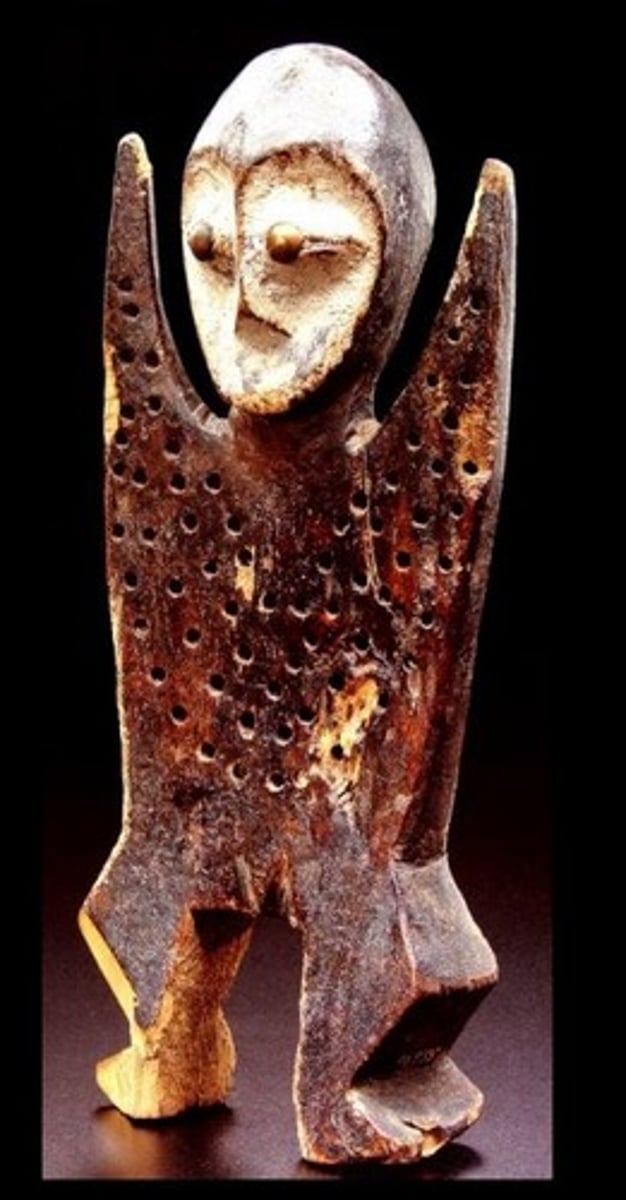African Art History Exam1
1/90
There's no tags or description
Looks like no tags are added yet.
Name | Mastery | Learn | Test | Matching | Spaced | Call with Kai |
|---|
No study sessions yet.
91 Terms
Bilongo
Activating medicines within Nkisi
mpemba (kongo)
White kaolin clay; chalk; land of the dead
Ndoki
Someone who by occult means harms his or her neighbors. (Kindoki occult practice)
Uganga
Expert owner/operator of a Nkisi
Bakisi
A spirit personality controlling a particular activity or function
Nkondi (Mikondi) Nkisi Nkondi
A loosely defined class of minkisi whose functions include hunting Ndoki and other unknown wrongdoers. Often wooden figures stuck full of nails and other hardware. From Konda, they hunt at night.
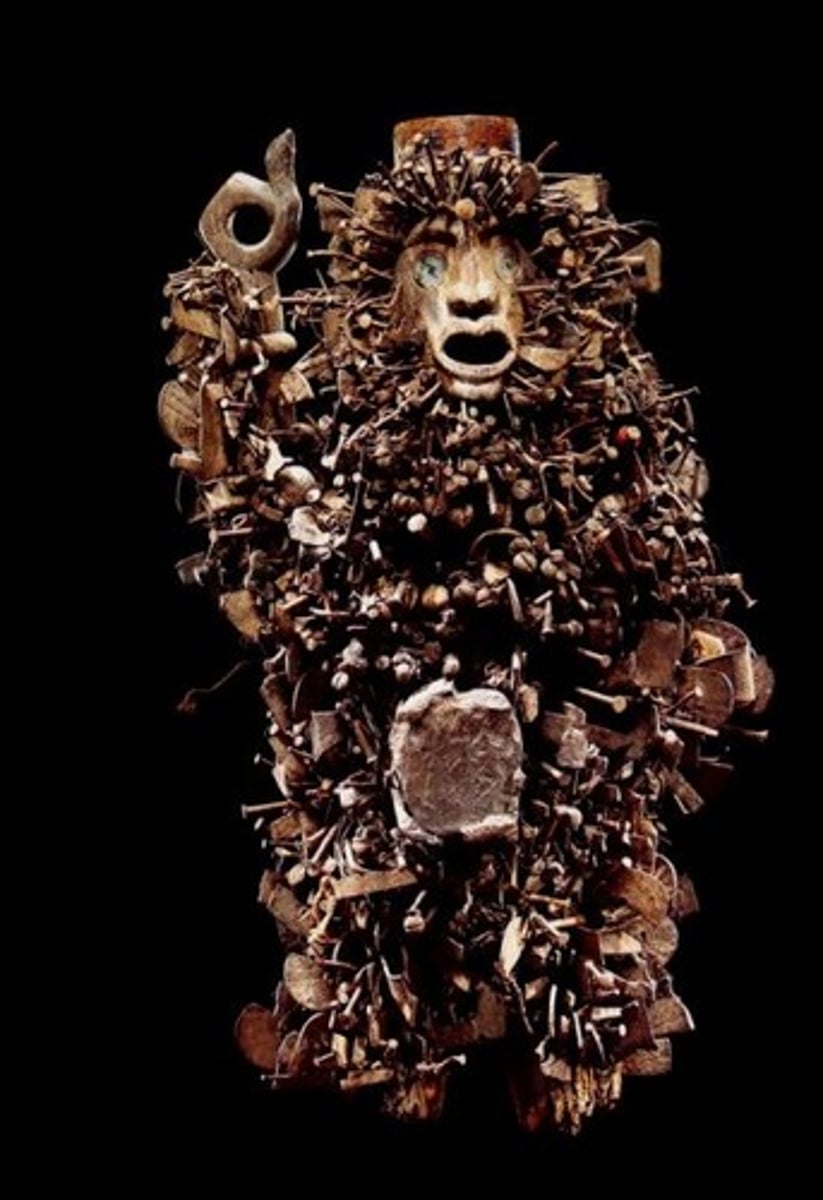
Christianity in Congo 16th Century (Portuguese)
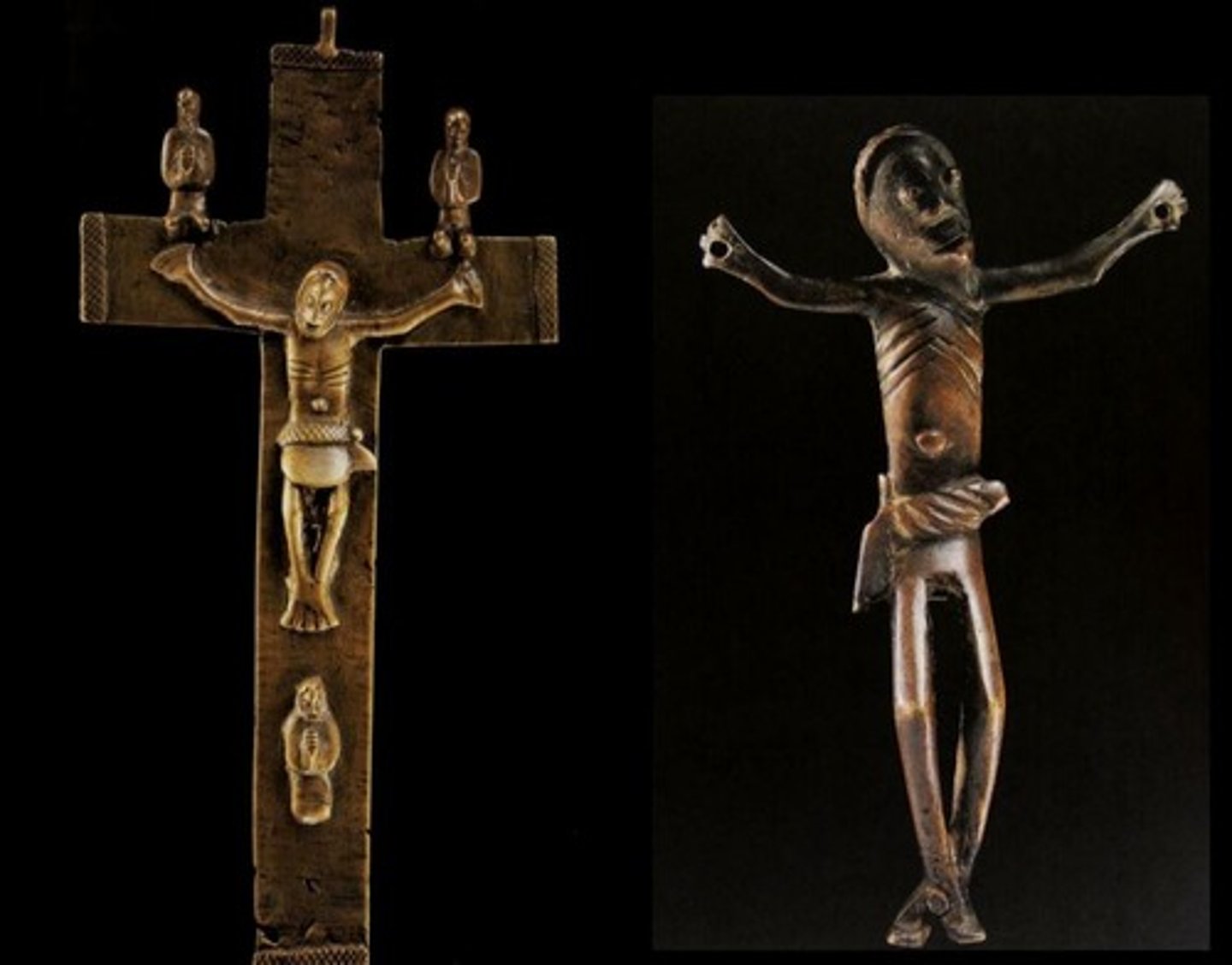
St. Anthony of Padua
Toni Malau (Symbol of political Power)
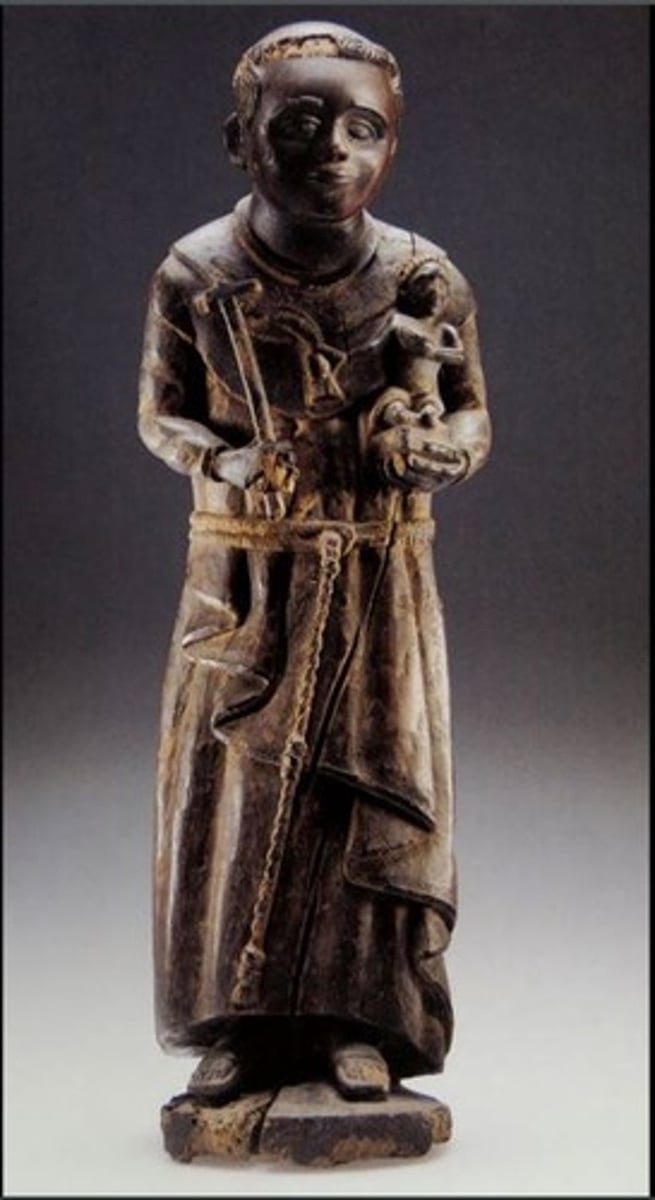
Nyombo Bwende (Symbolic portrait of deceased)
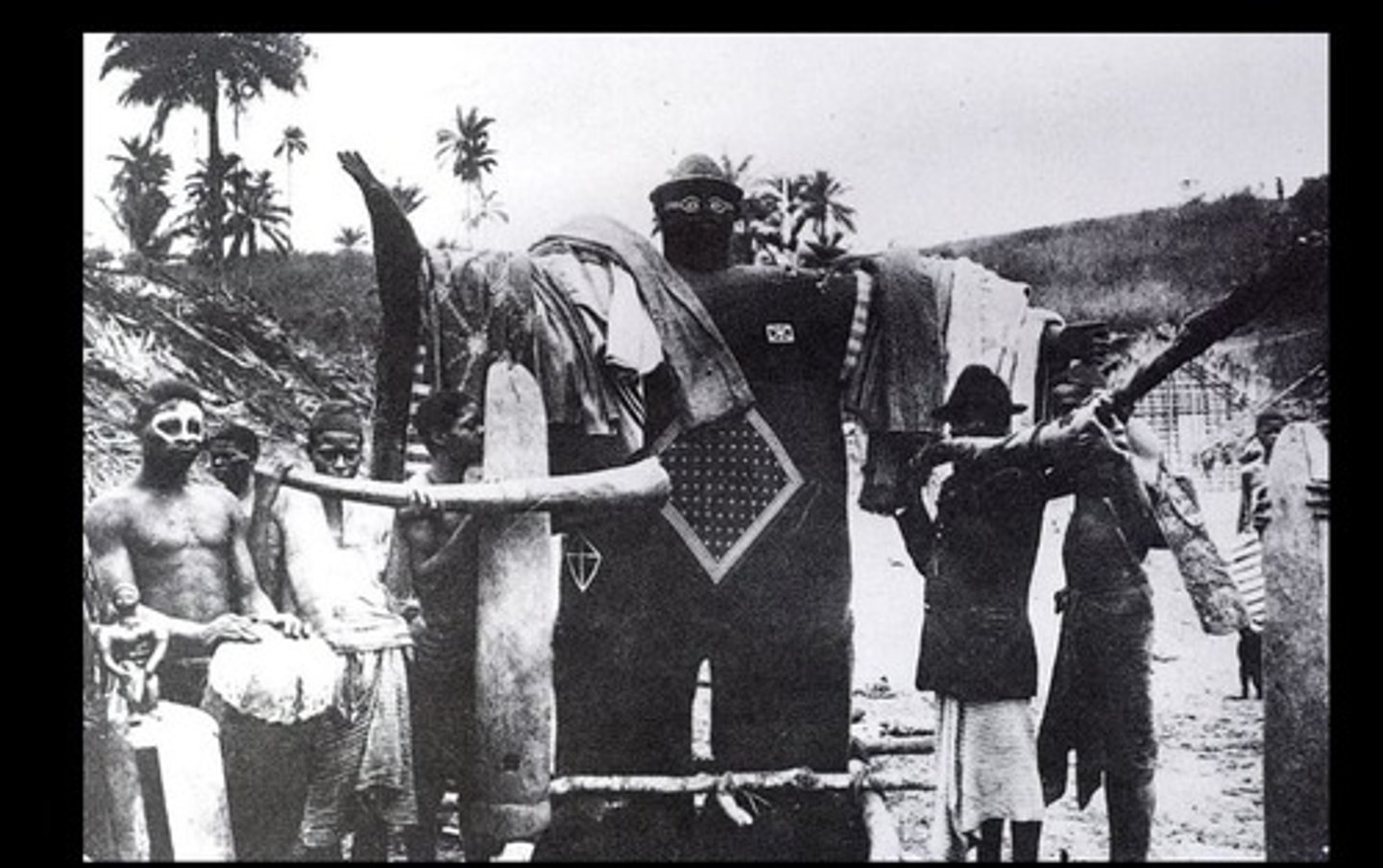
Pfemba (Kongo)
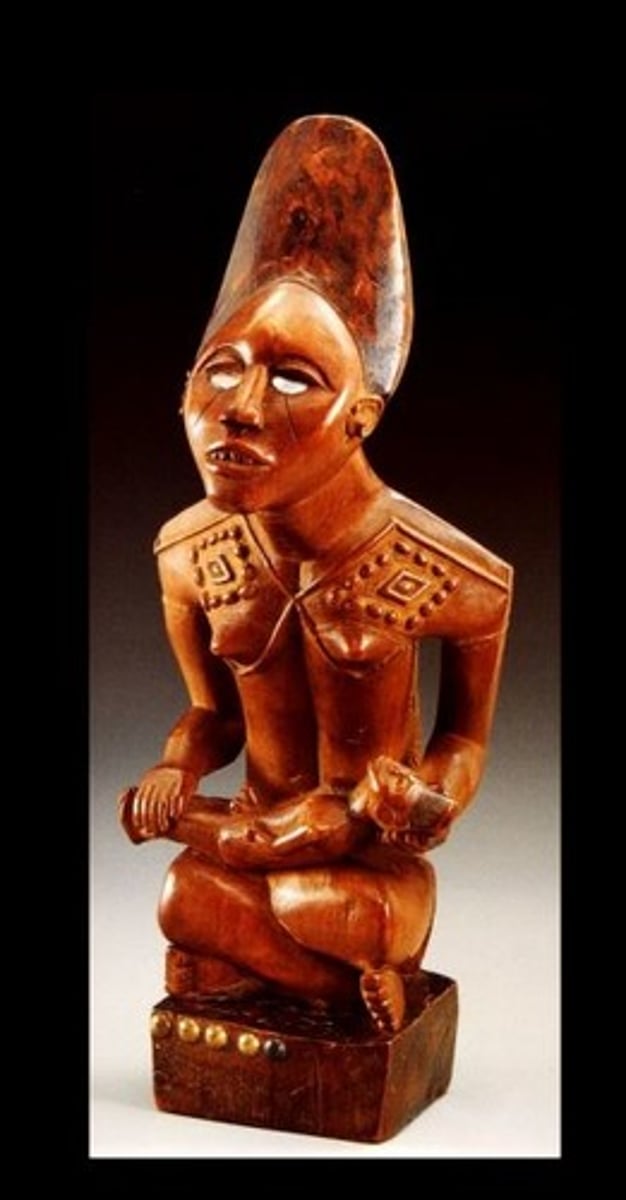
Master of Kasadi Pfemba
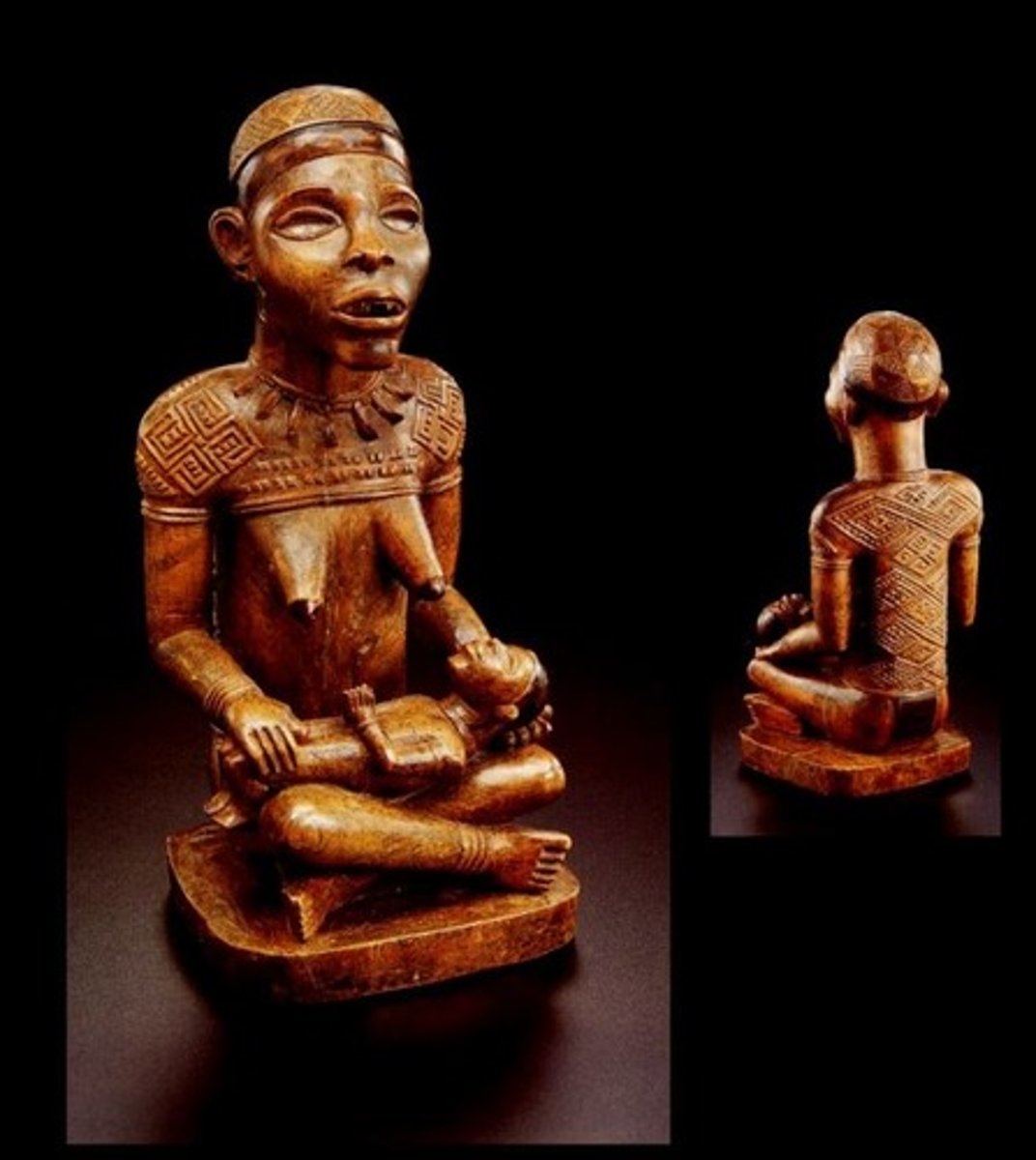
Muzidi (Beembe people)
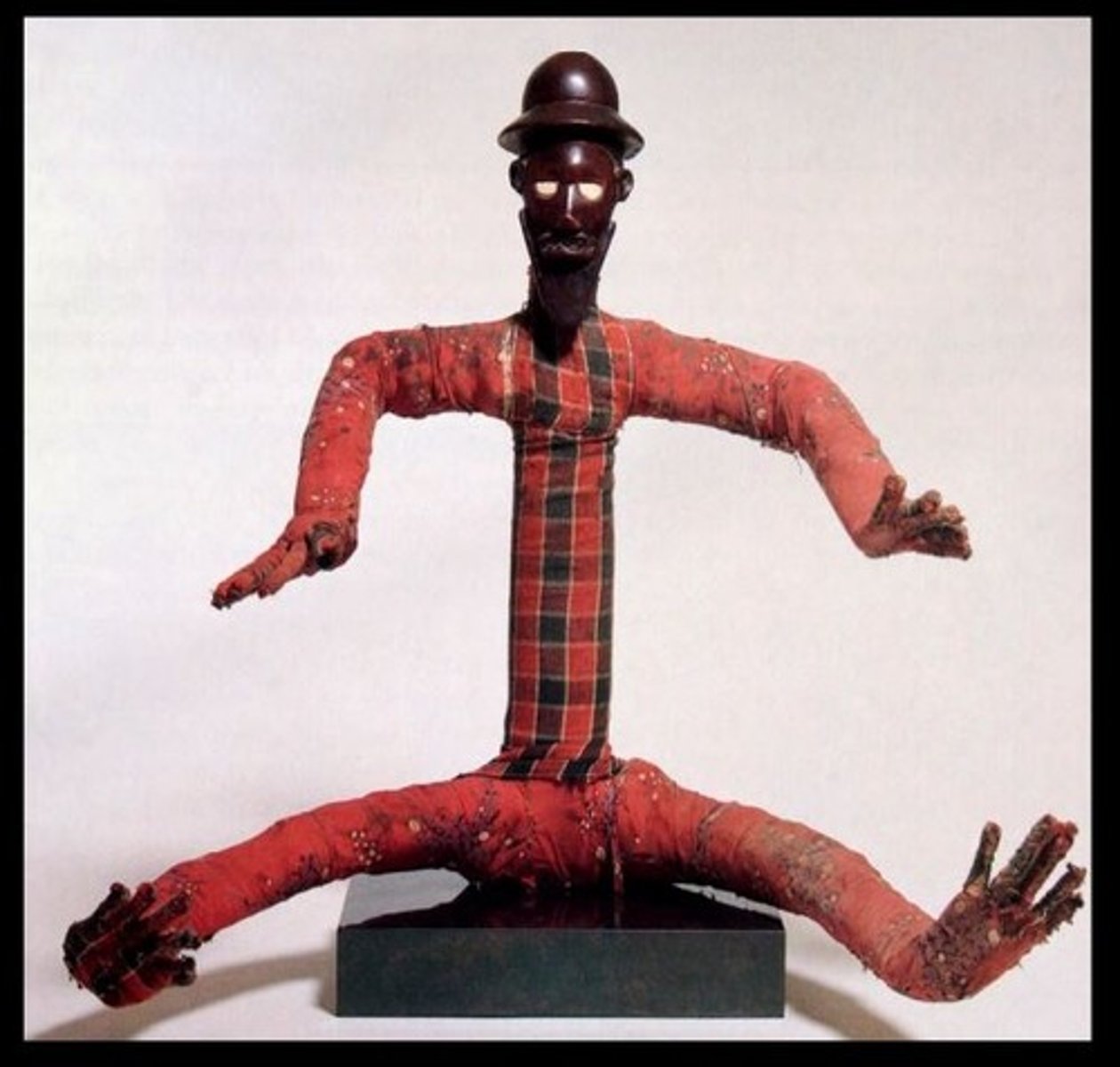
Minkisi (Nganga Female Diviner) (Yombe)
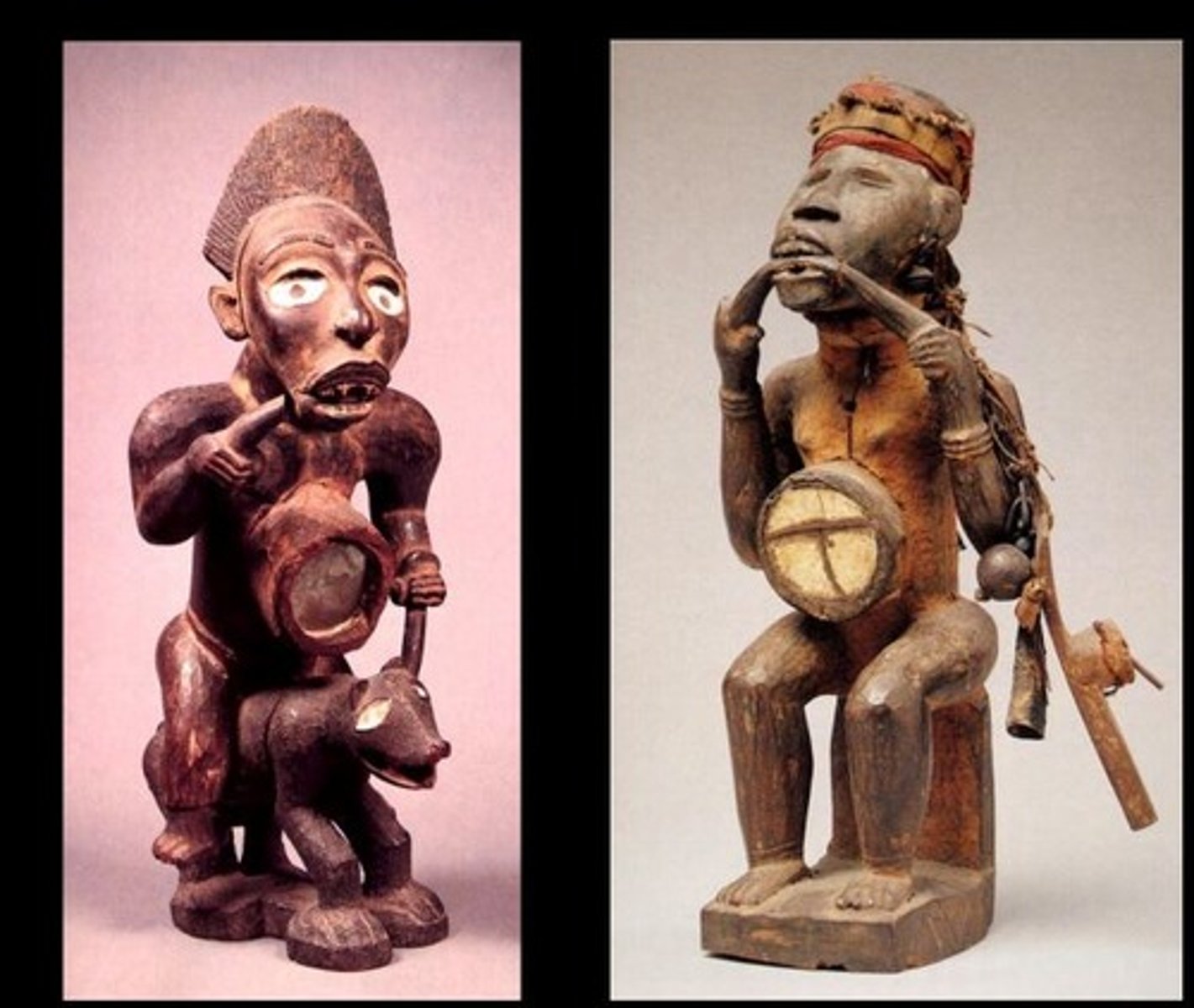
Nkisi Mungundu
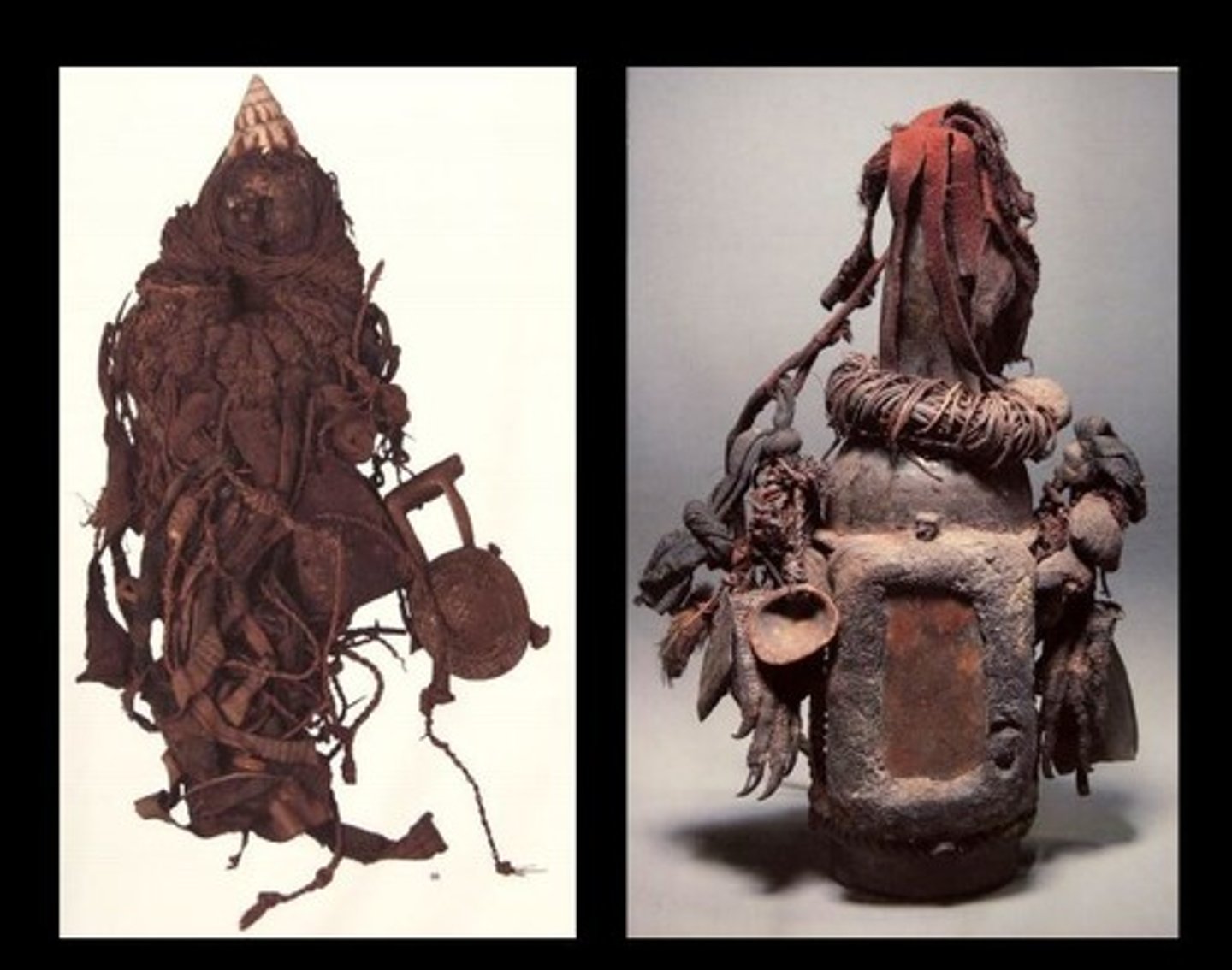
Nkisi Kozo
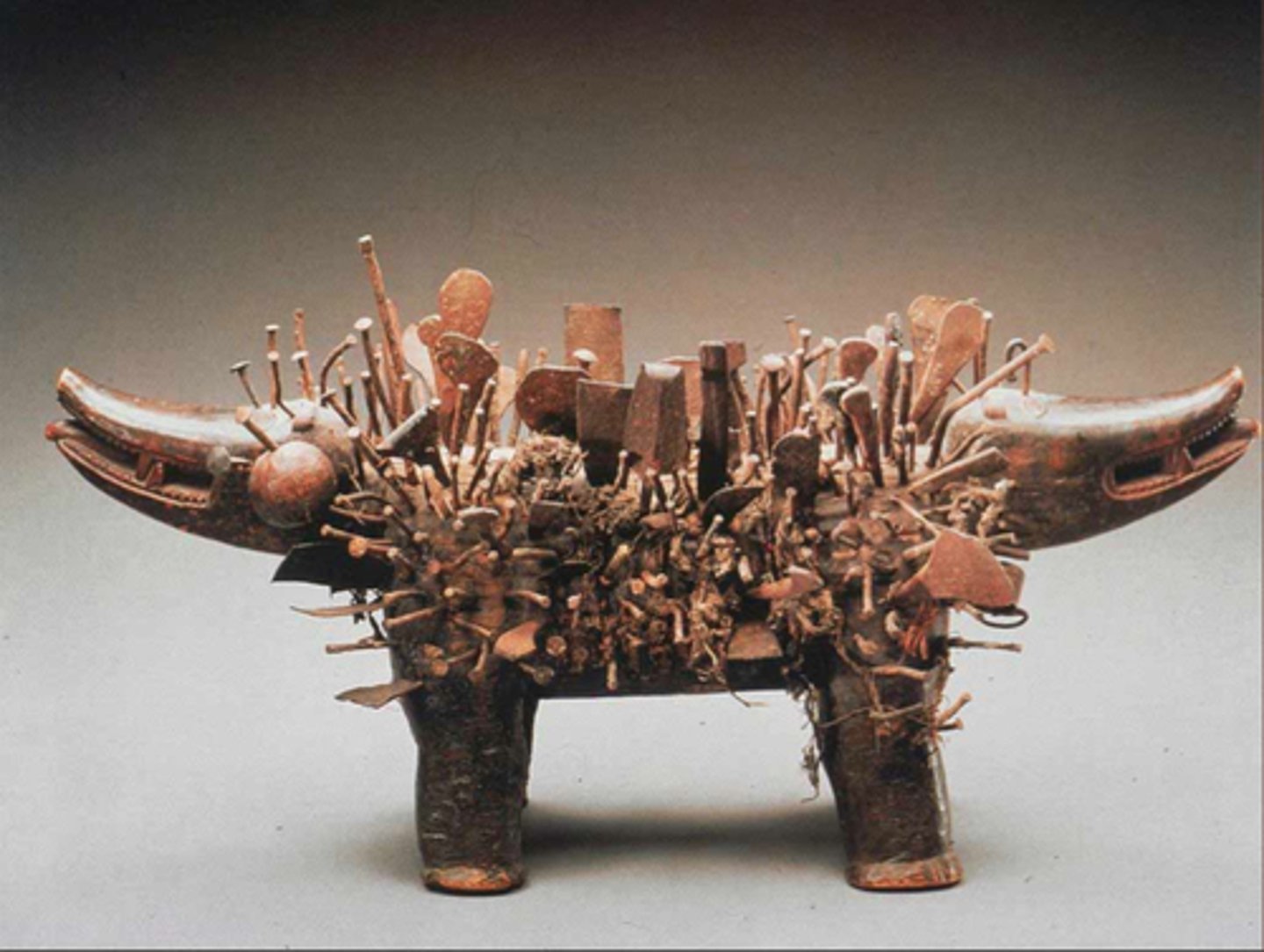
mbulu ngulu
The wood-and-metal reliquary guardian figures of the Kota of Gabon.
Mbulu Ngulu (Kota)
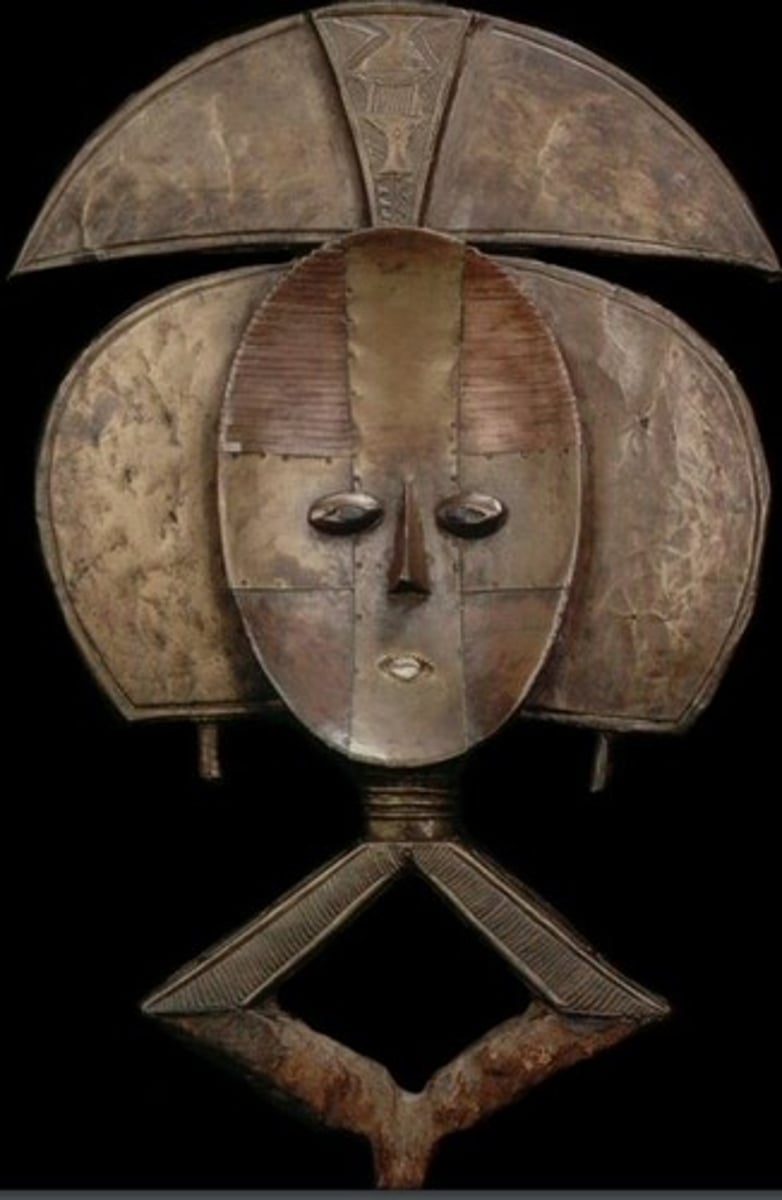
Nsek-bieri
Cylindrical Bark box that carried the remains of important ancestors to create a portable shrine
Bieri (Fang)
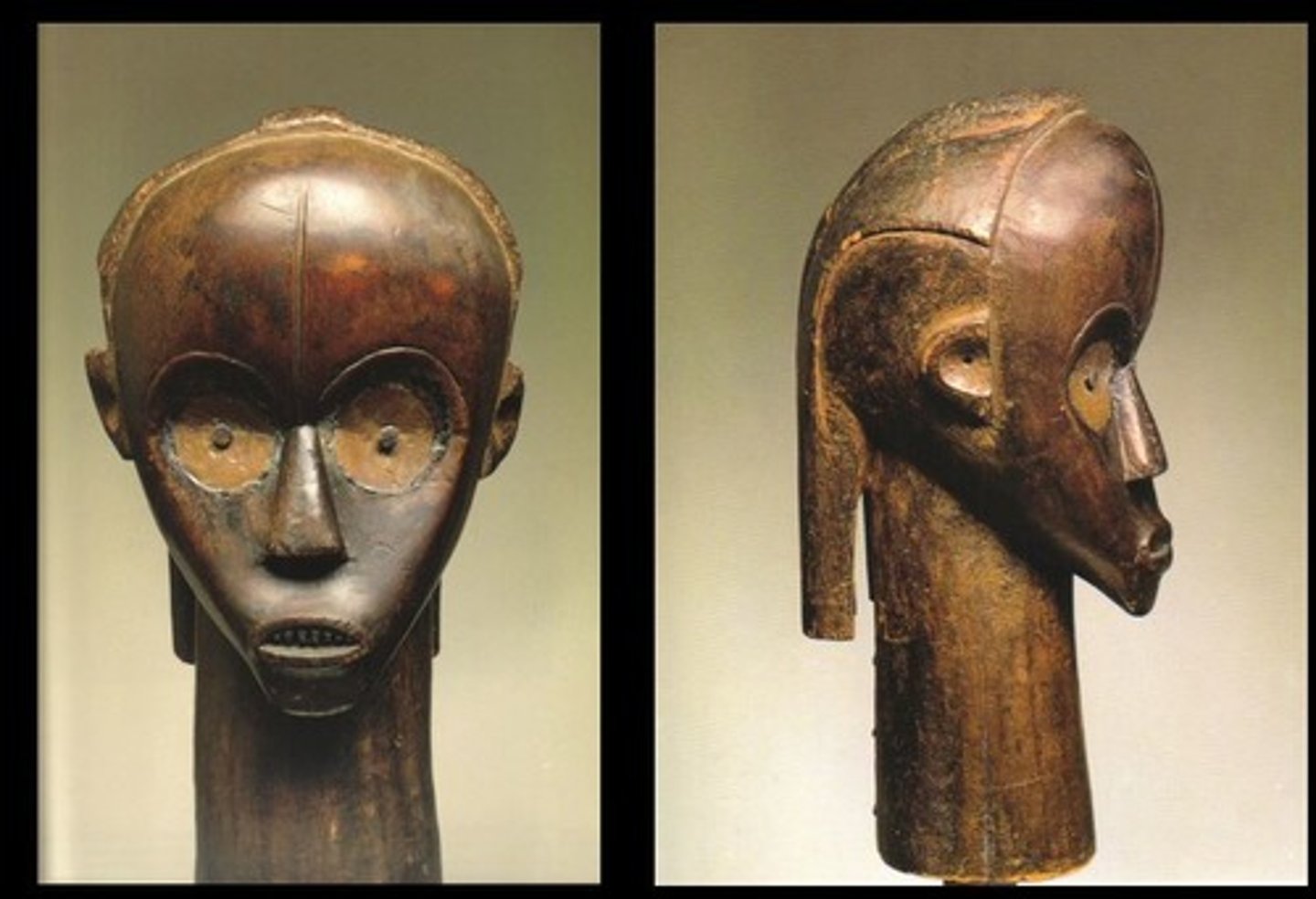
Northern Fang Style Full bodies
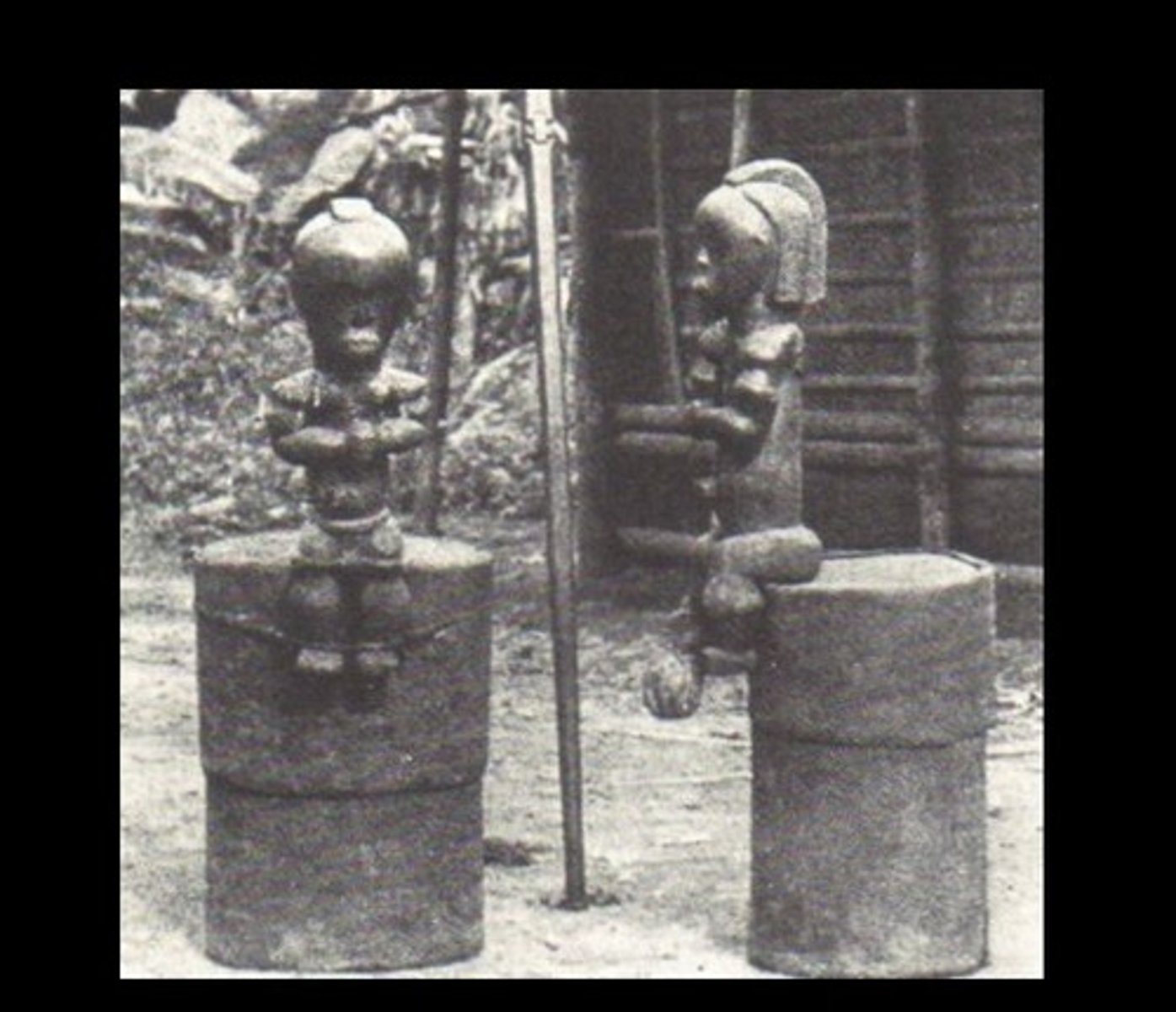
What is Masking?
Chibinda Ilunga
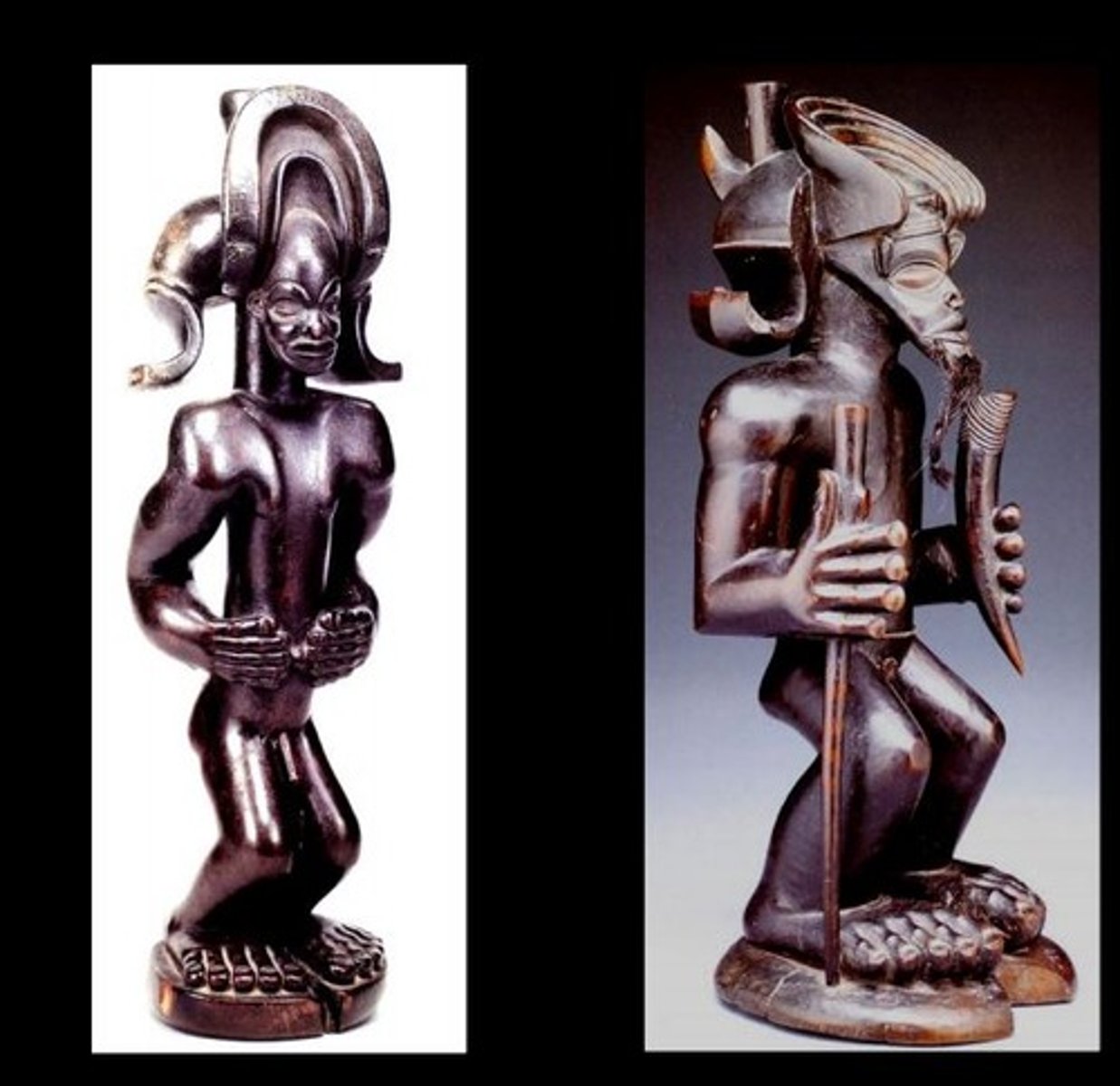
Illunda Regalia
Staff; Leader Horn; Hunter
Horns denote different levels of power
Beard denotes age and wisdom
Chokwe tend to have very large hands and feet displayed on figures
Illunda Regalia (Staves)
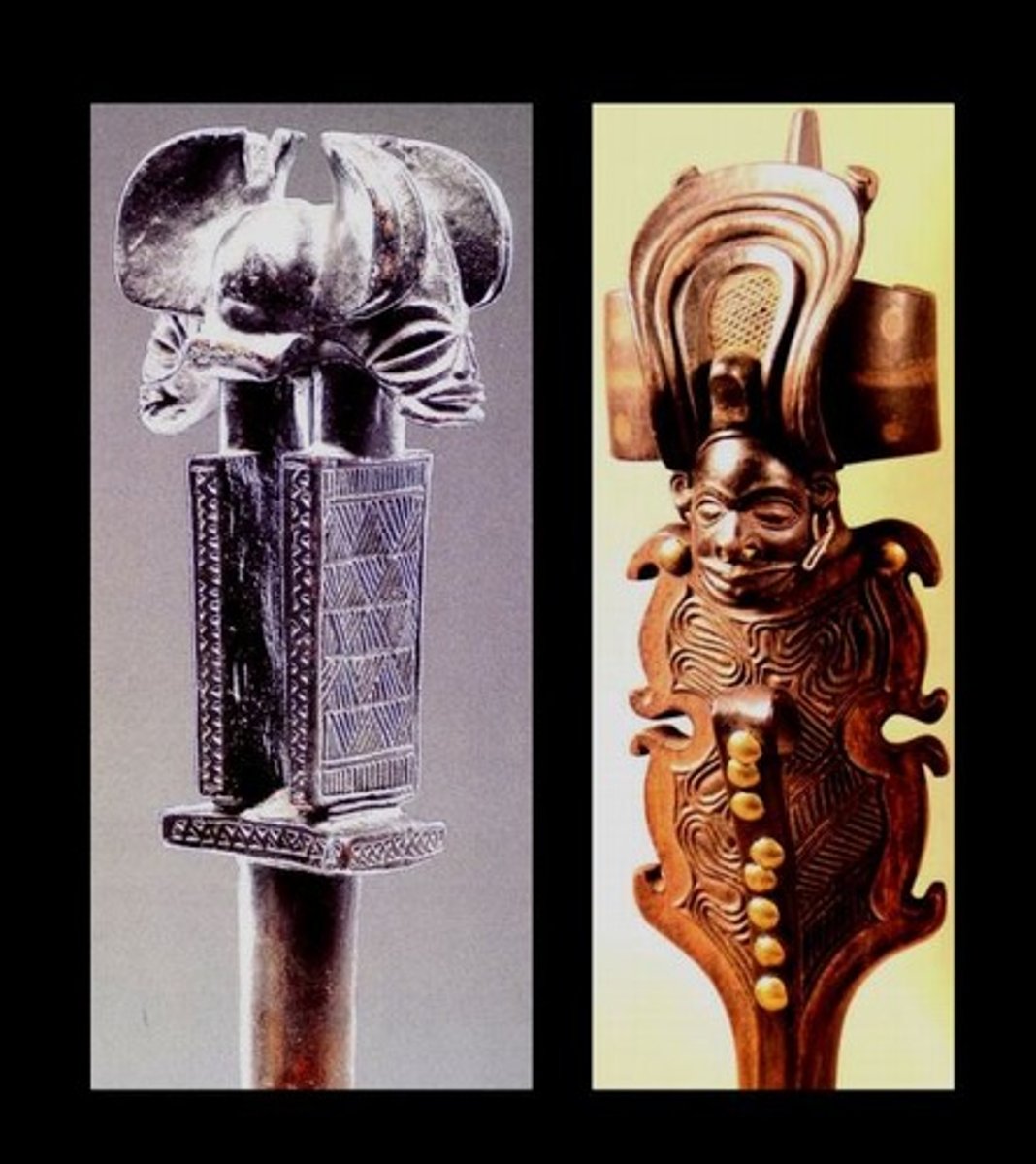
Ivory Hunting Whitsle
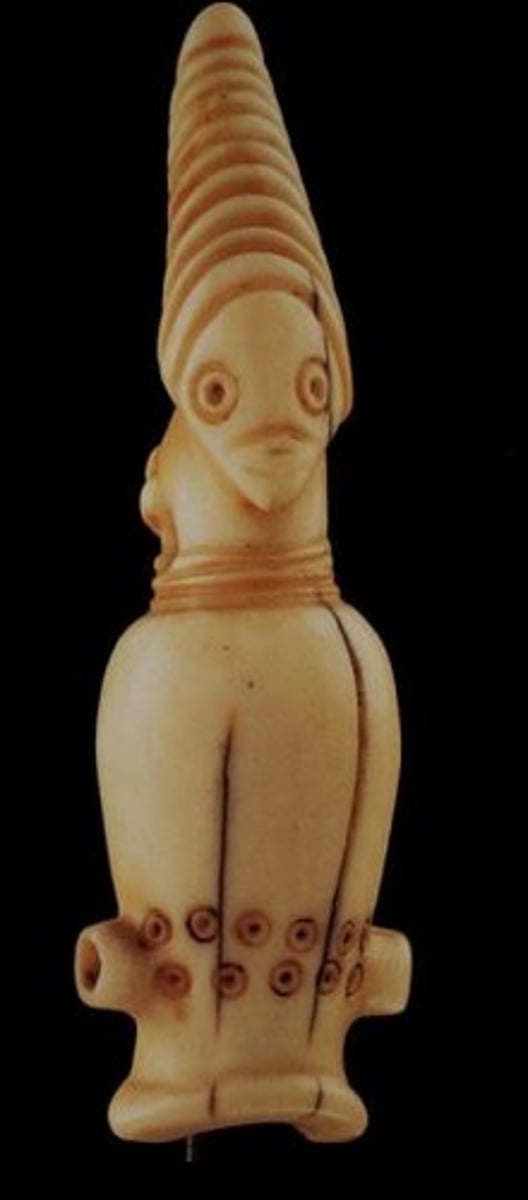
Kasanda
(Divining Device) (the little world that holds the objects)
Wicker Basket with small token pieces (Tupele) that help diviner divine. Shaken then divined from the layout of objects
ngombo ya cisuka
Wicker basket divining
Kalelwa & Chikunza
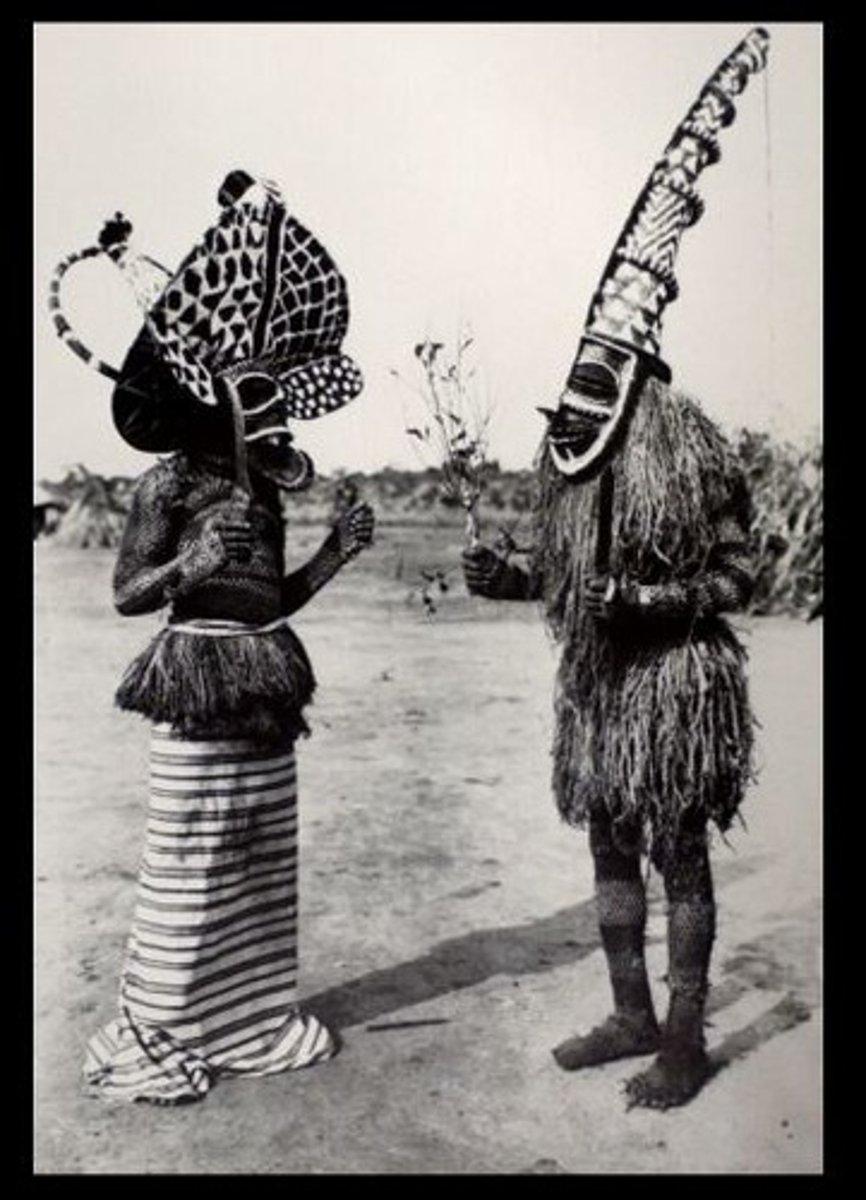
Chikunza
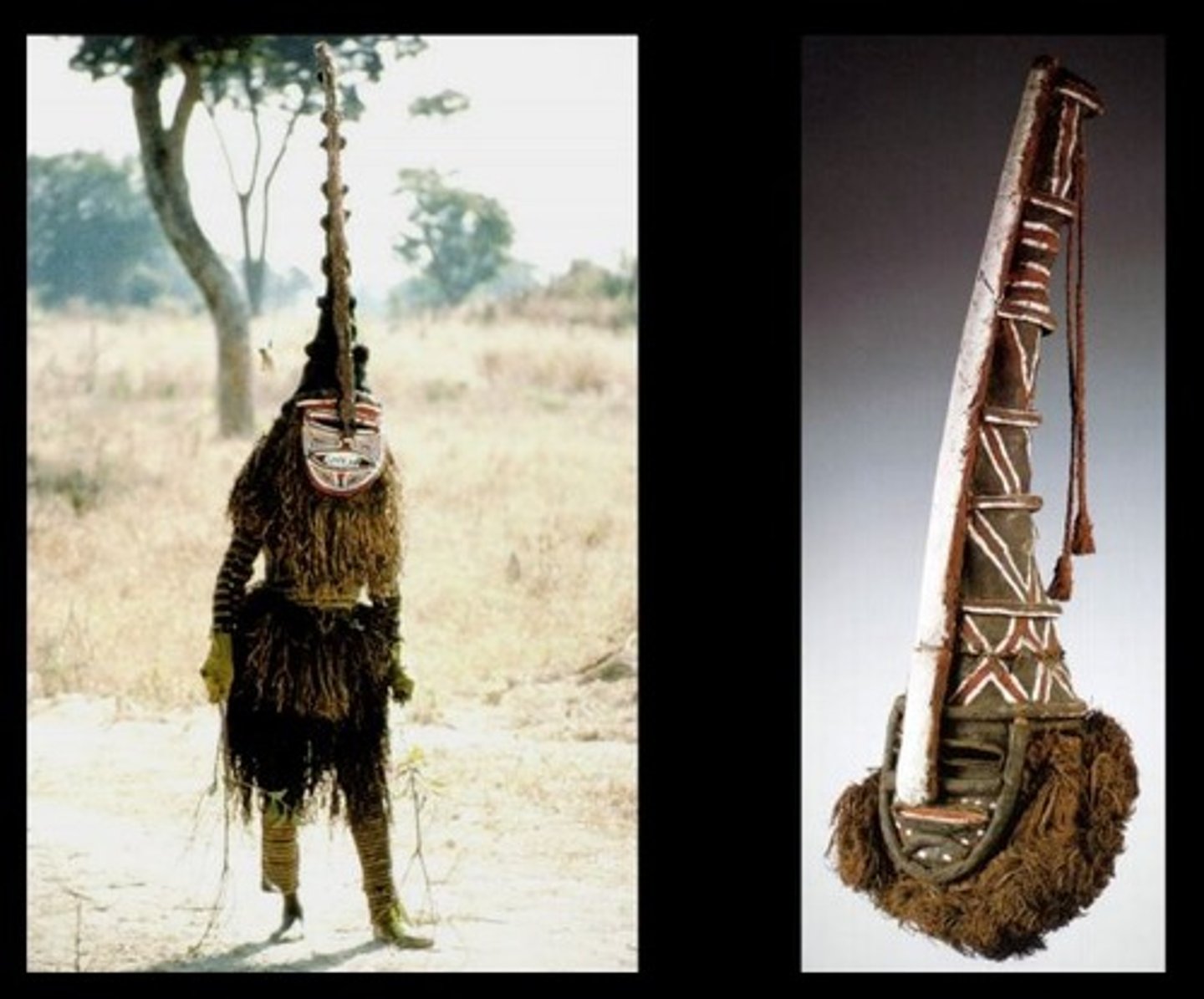
Kalelwa
Figure Left
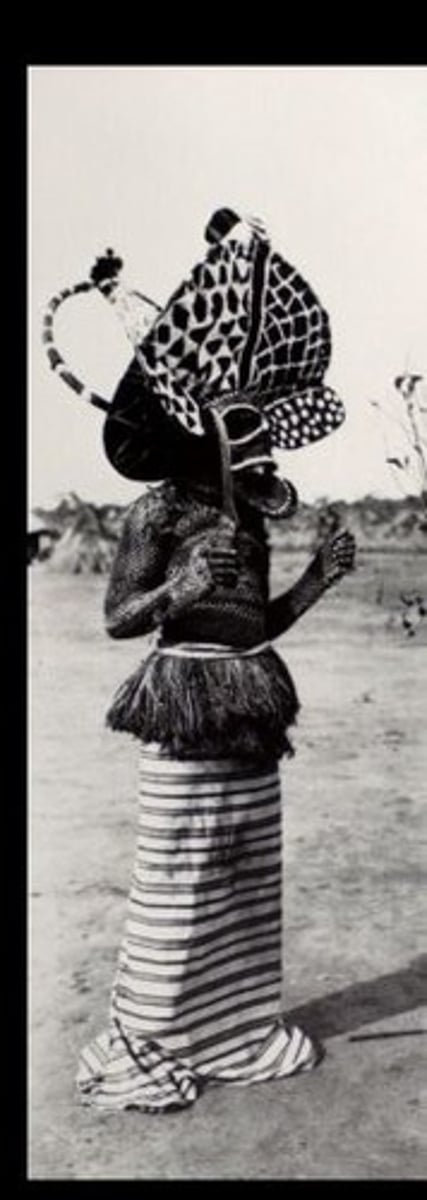
Chikunza Info
conical shape, leader of the initiation, father of initiation, masks, masking, fertility, knowledge (Spiritual Leader)
Protects women during childbirth, protects hunters
Kalelwa Info
Crescent and two bows (Chief)
Masks can only be worn by men
Chihongo
Generally made from wood, can be made from wicker and resin
4 triangles around a central diamond (Chokwe, assoc. Sona)
Old man, sunken in eyes, sagging eyes, Filed Teeth
Filed teeth are a symbol of beauty, knowledge, respected person
Also represents wealth, Metal adornments or earrings
Used to go to other villages to collect taxes
Used today to represent old men in a comical fashion, in current times it is specifically used to be comical if made of wood
Wooden holes can be used to attach headdress or support mask
must be accompanied by Pwo
Pwo
No headdress, Rafia fiber hat, sunken eyes, filed teeth masked by a man with fake breasts
Pwo Image
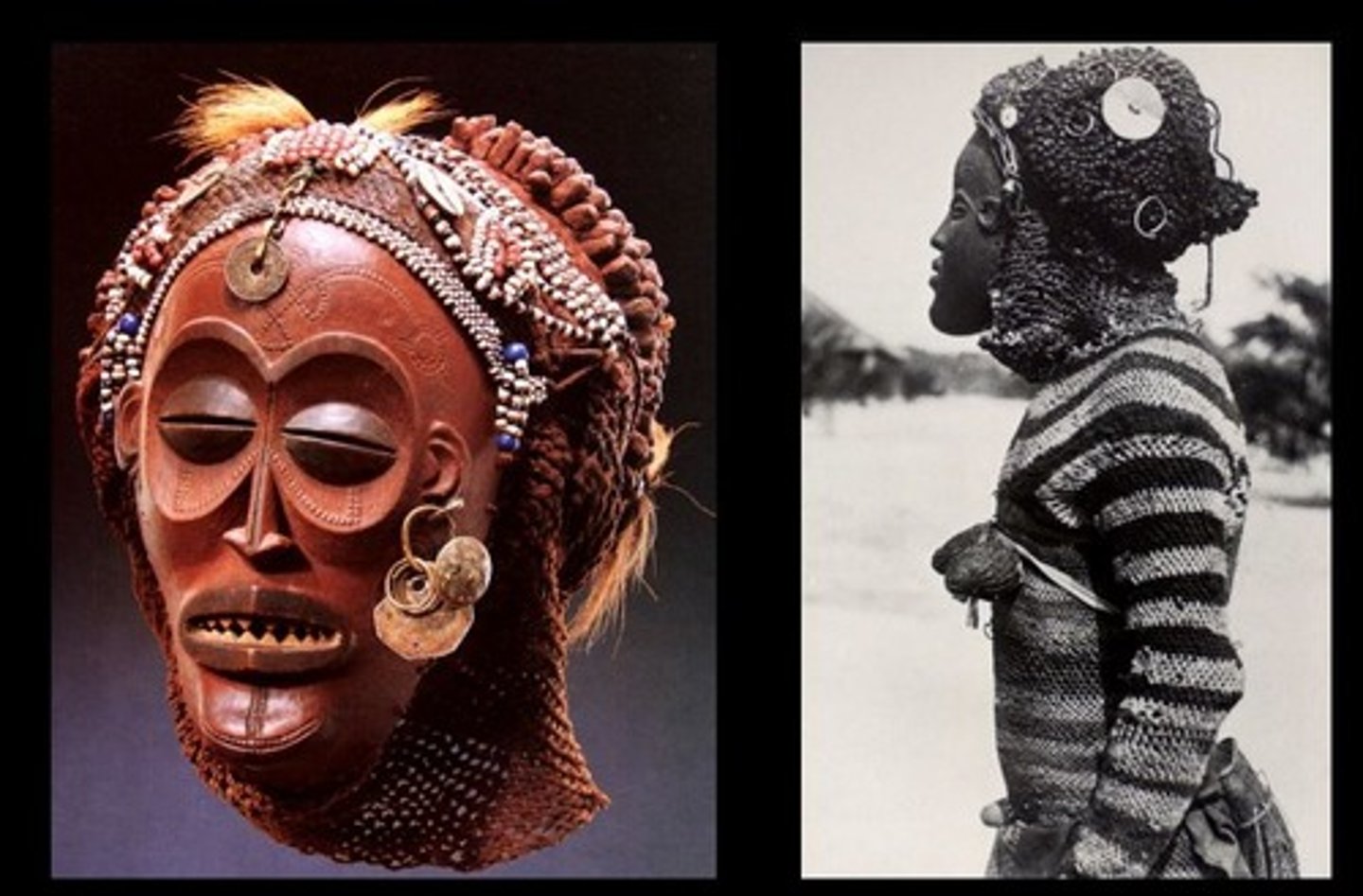
Chihongo Image
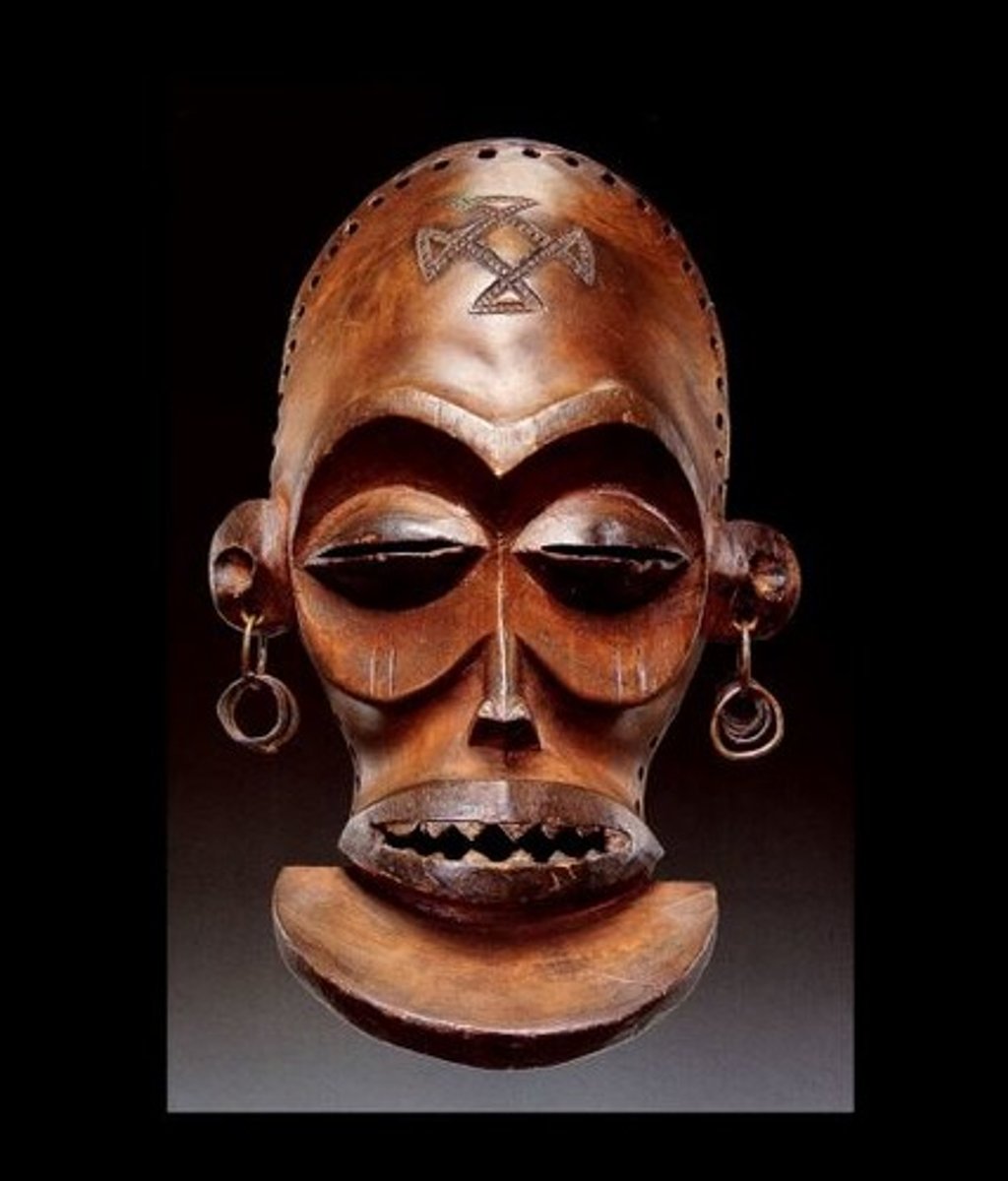
Yaka Chief Kyambvu Kindazi
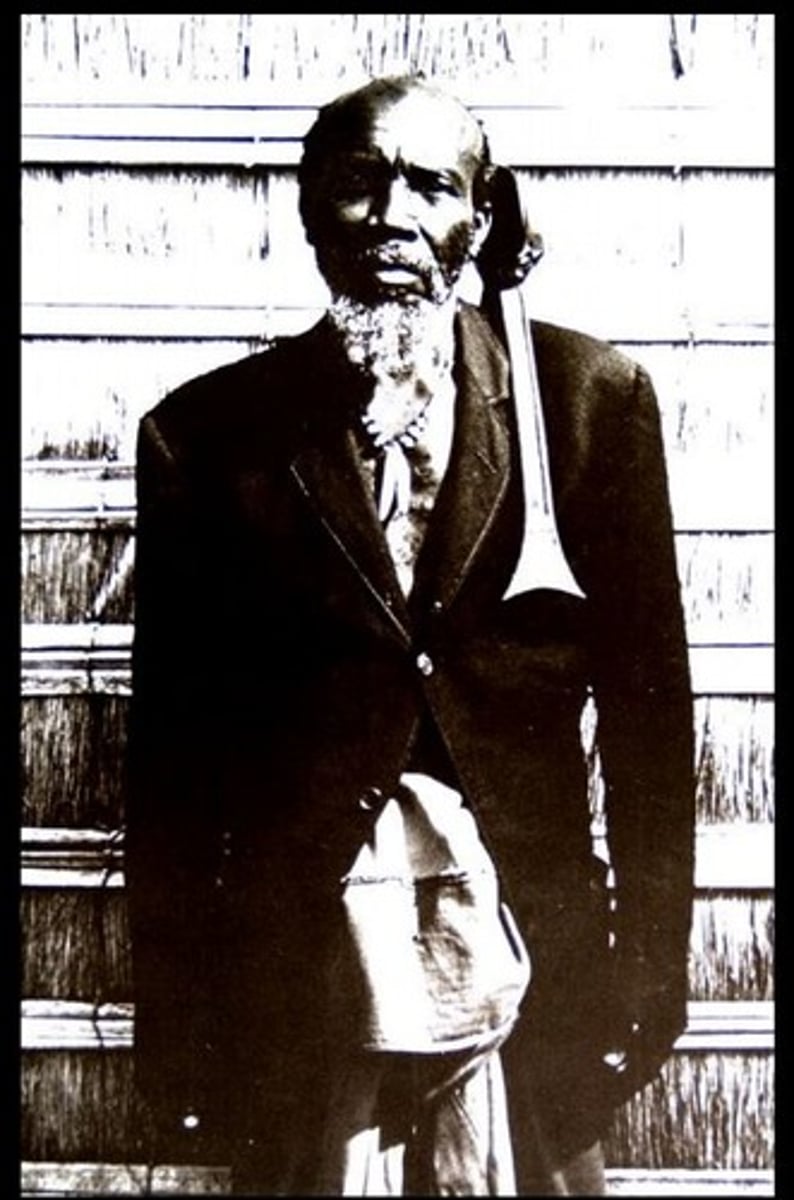
Mbala adze (Khaandu)
Worn as clothing, symbol of position and power
Chief comes into power when previous chief passes away
Kopa is given to the new chief (Yaka and Suku)
Can only be touched by the current chief
Presented to new chief alongside list of previous owners
Adze (Khaandu)
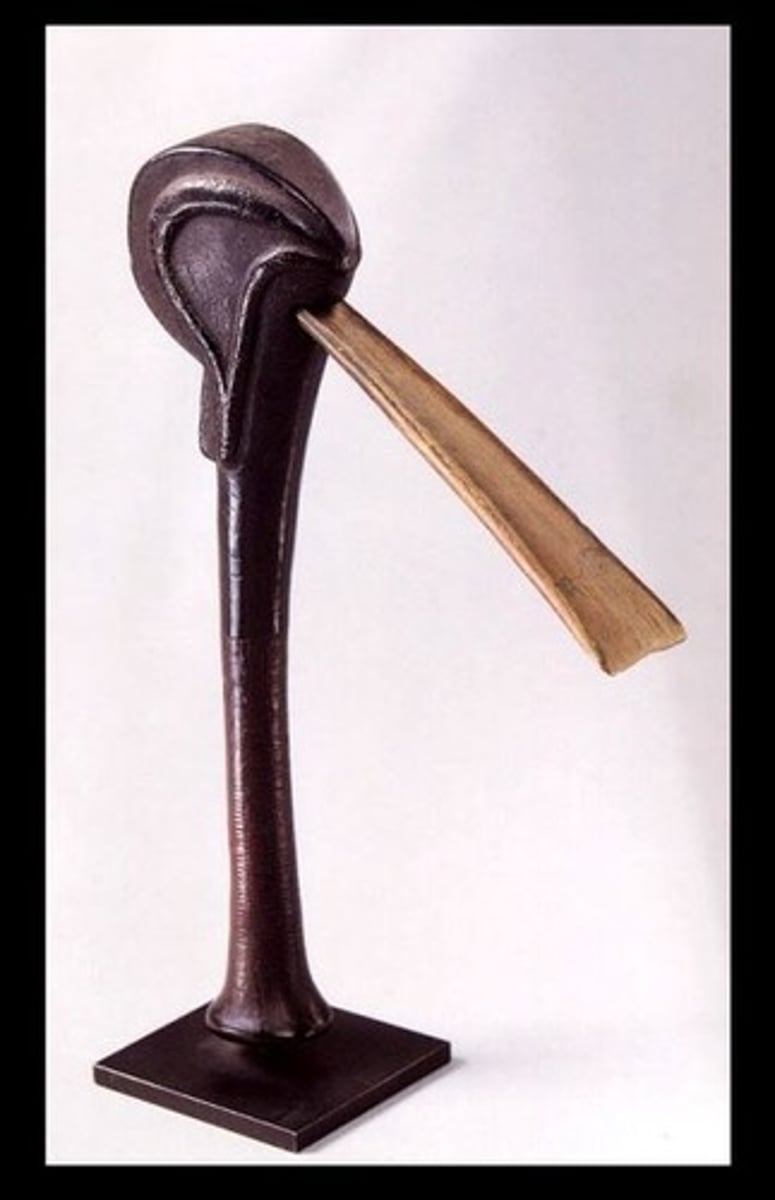
Yaka Diviner with Nkoku
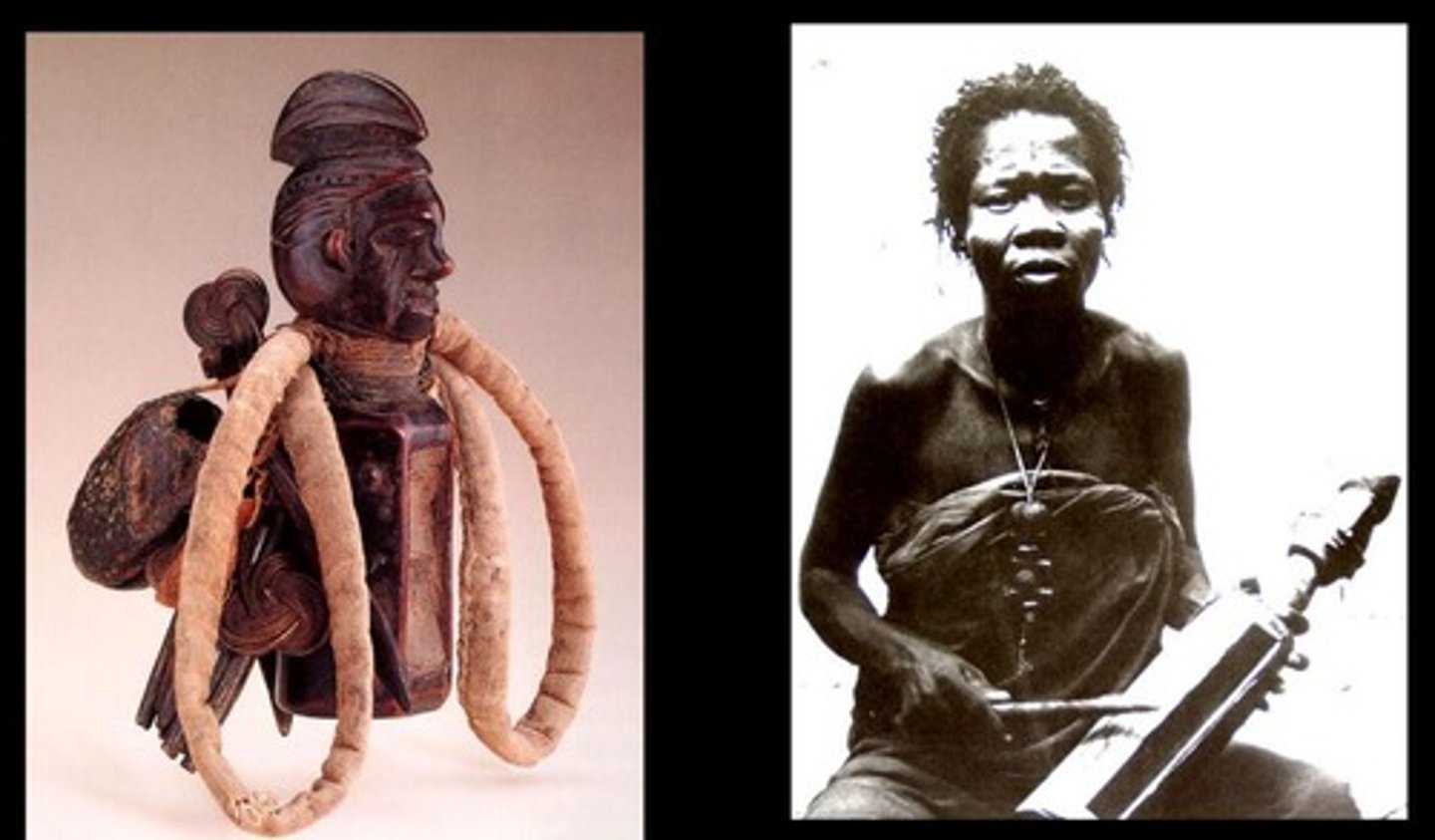
Nkoku
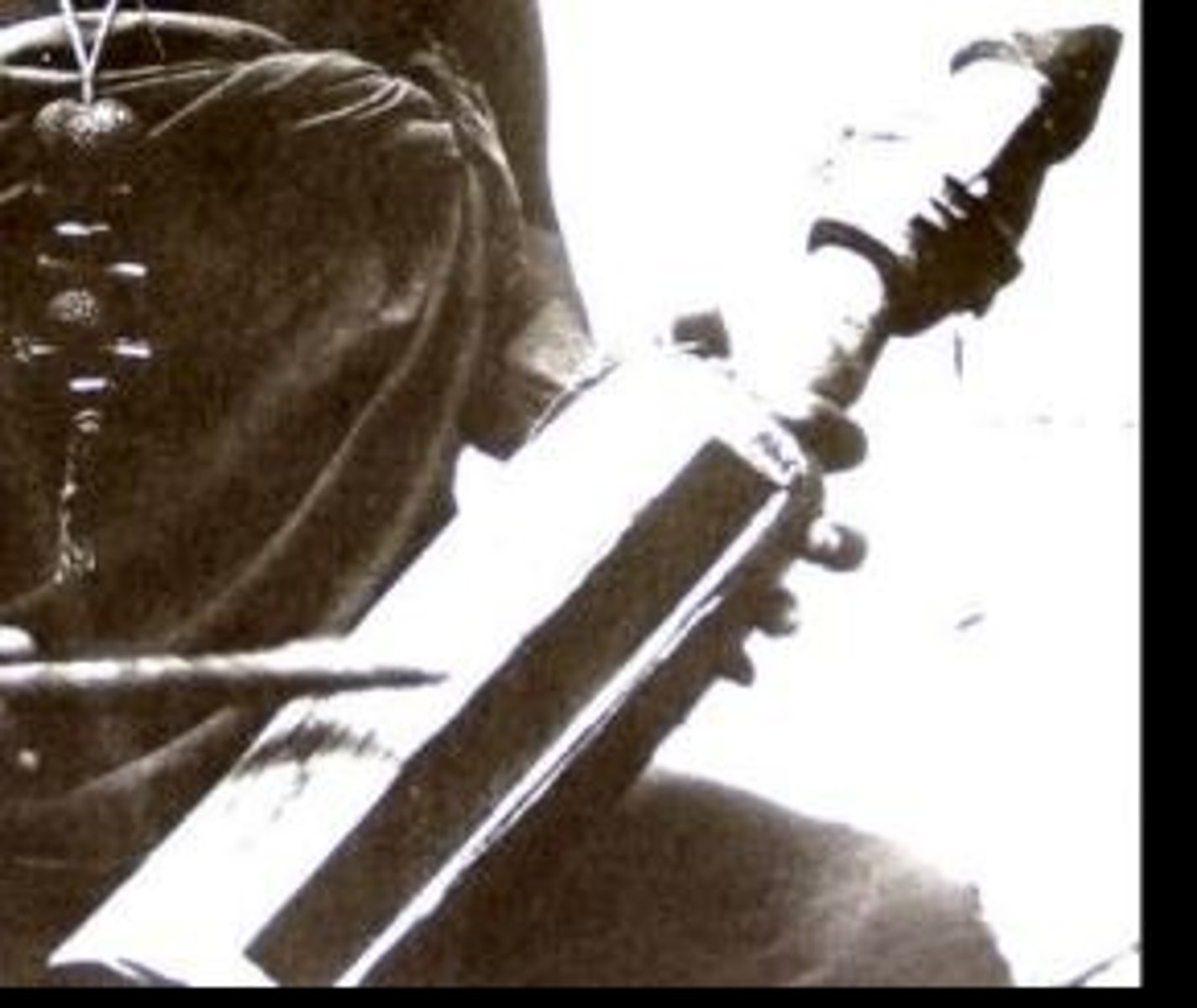
Mukanda Structure
Figurines
Posed around the structure
Structure
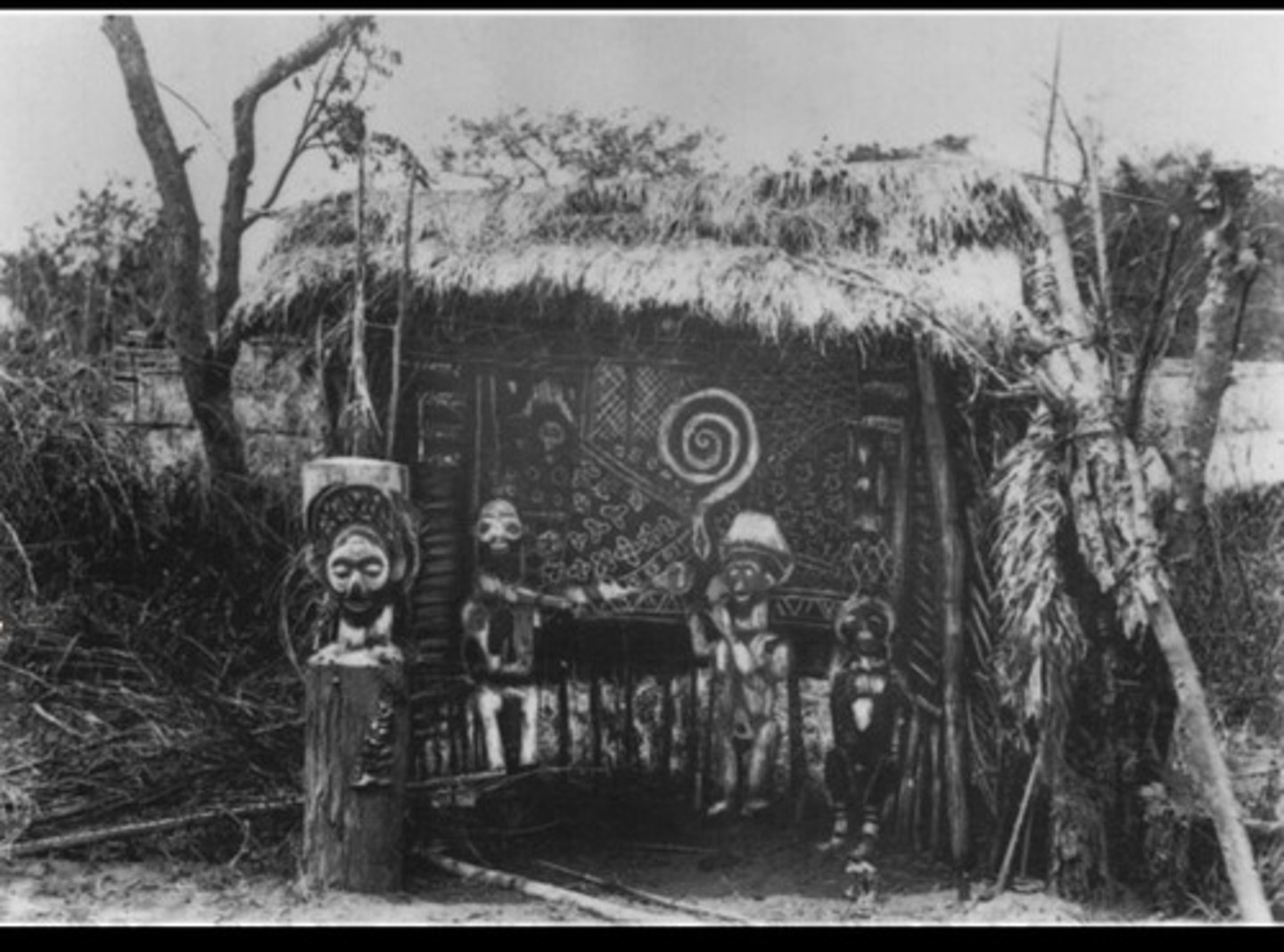
Mukanda
Cooperation
Mutual Respect
Respect for authority
Chiefs and Ancestors
Gender Differences
Sexuality
Kakuungu (Yaka)
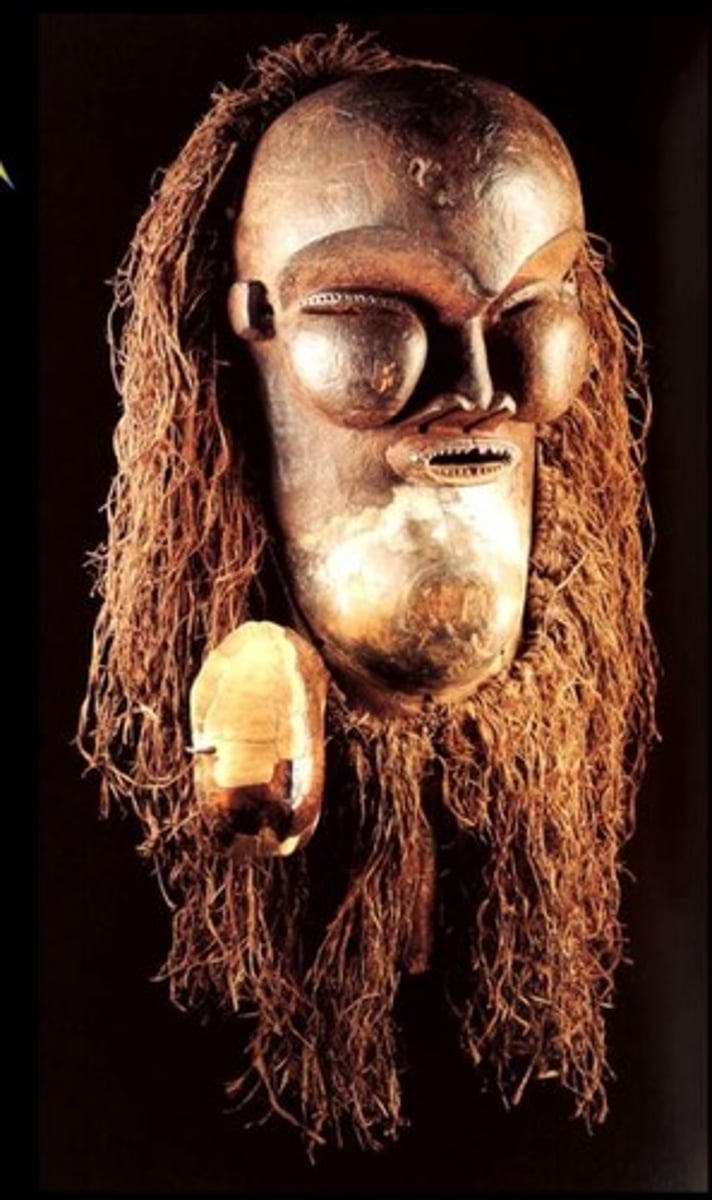
Kakuungu (Suku)
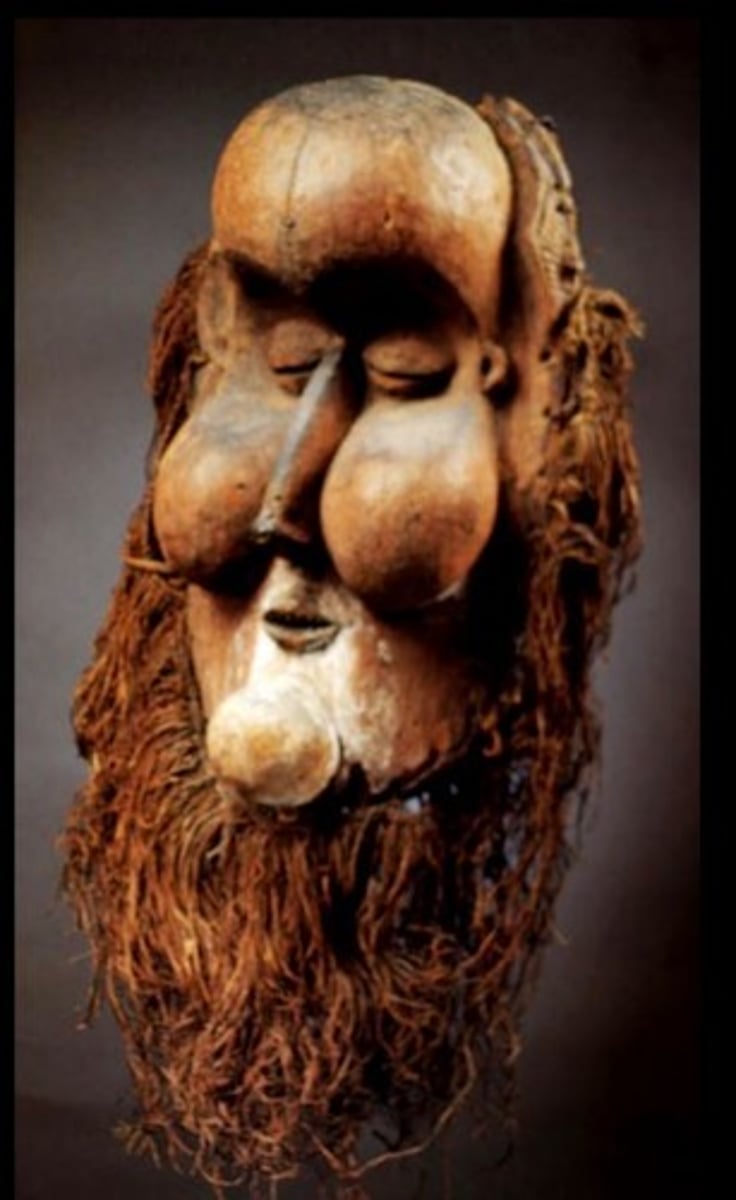
Kakuungu
Supposed to evoke a very old elder that is only concerned for themselves
Sickness mask
"Old Witch" Large and swollen
Painted white and red
Used to scare the initiates into behaving, can prevent sickness
Requires sacrifice of a goat, Worn by the head of a lineage
Can make you infertile or make you fertile
Owner elicits wealth through masks
Kibulu of chief Kombo Kiboto
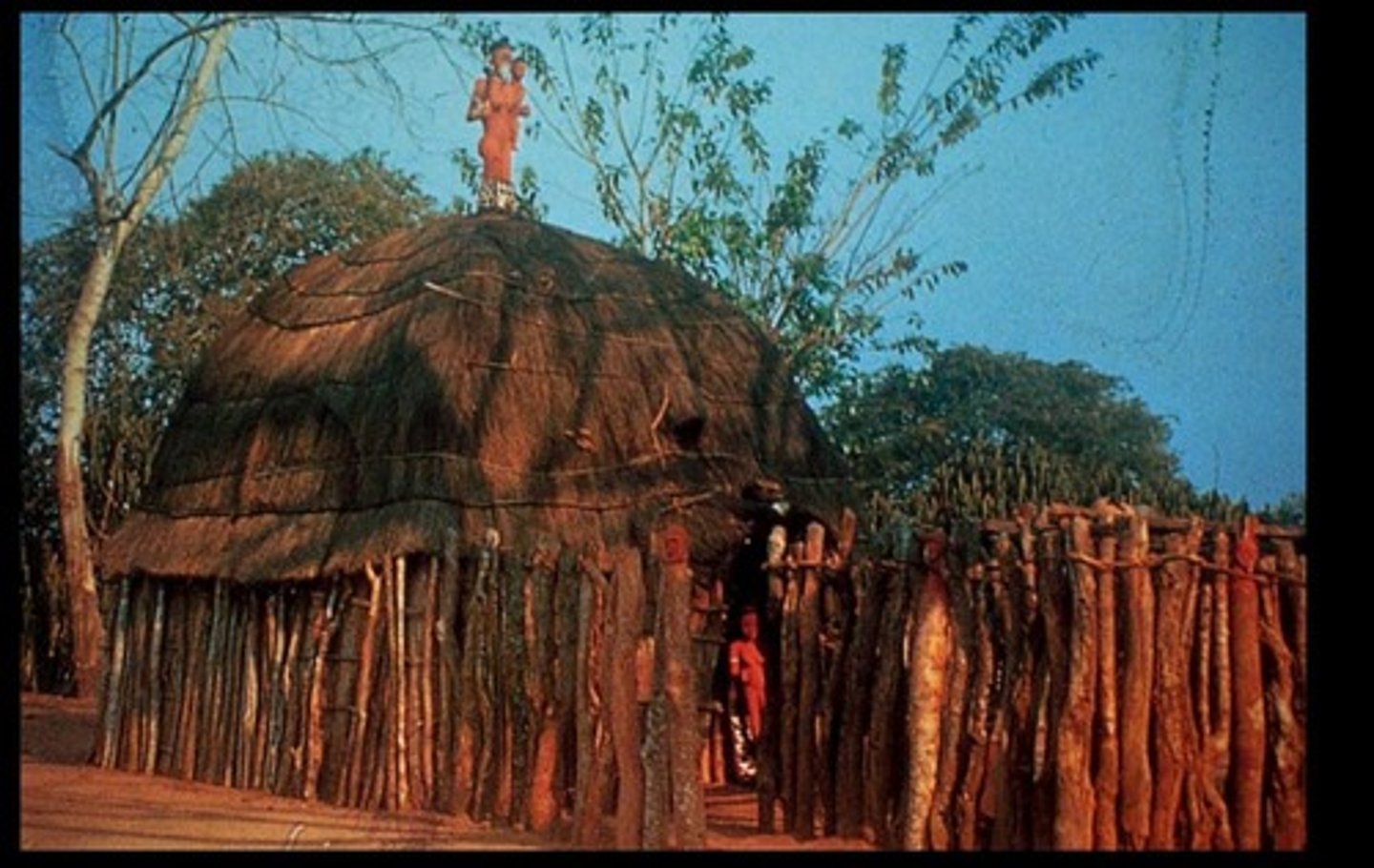
Pumbu Mask (Eastern Pende)
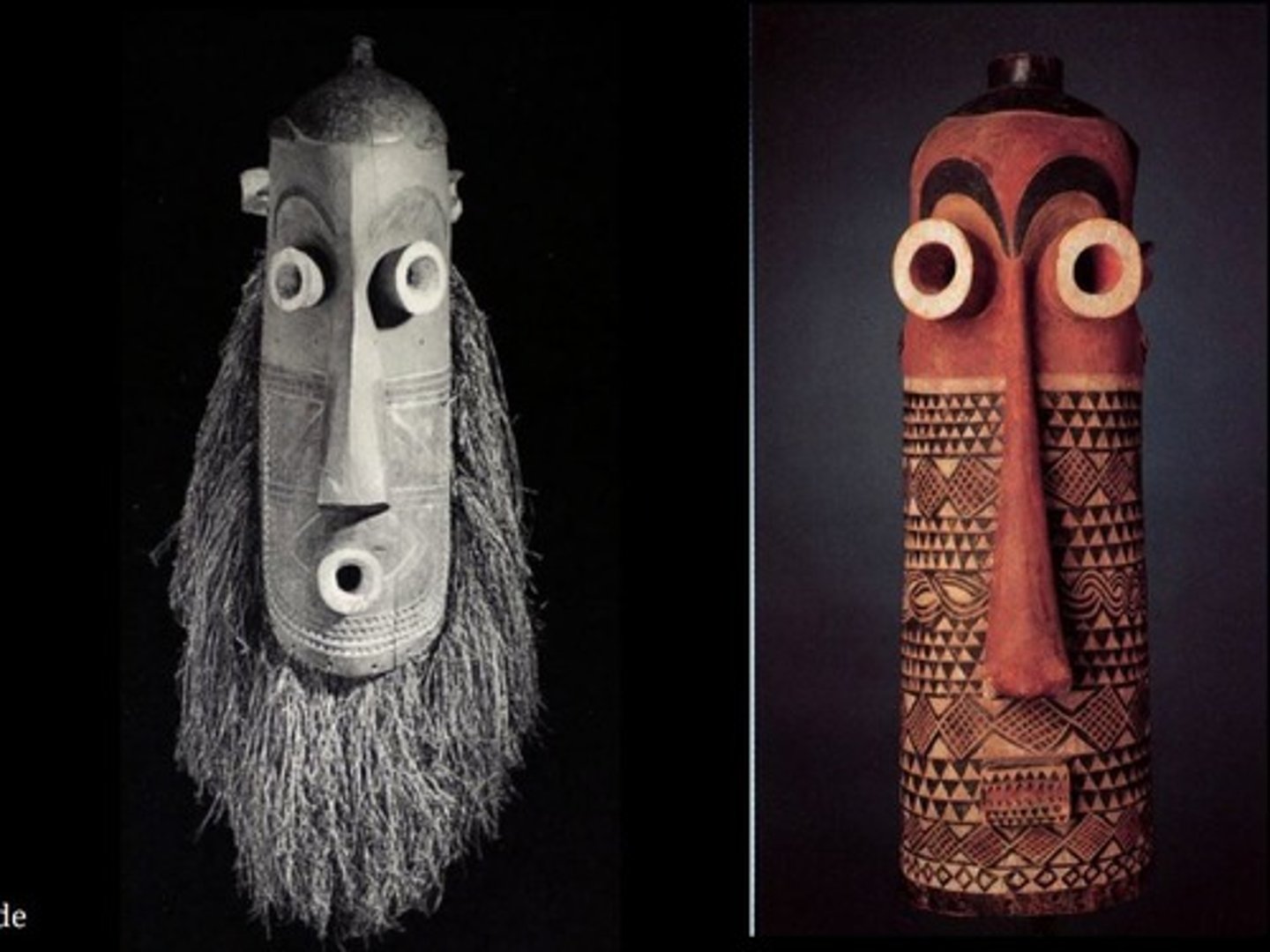
Performing Pumbu
Represents the Chief
War-like creature
Comes out during extreme circumstances such as illness of chief or anger of ancestors, Famine or problem with weather
Surrounded by raffia
Men tie cords to pumbu to restrain him
Can demand tribute
Comes out of kibulu and must return, must kill before returning
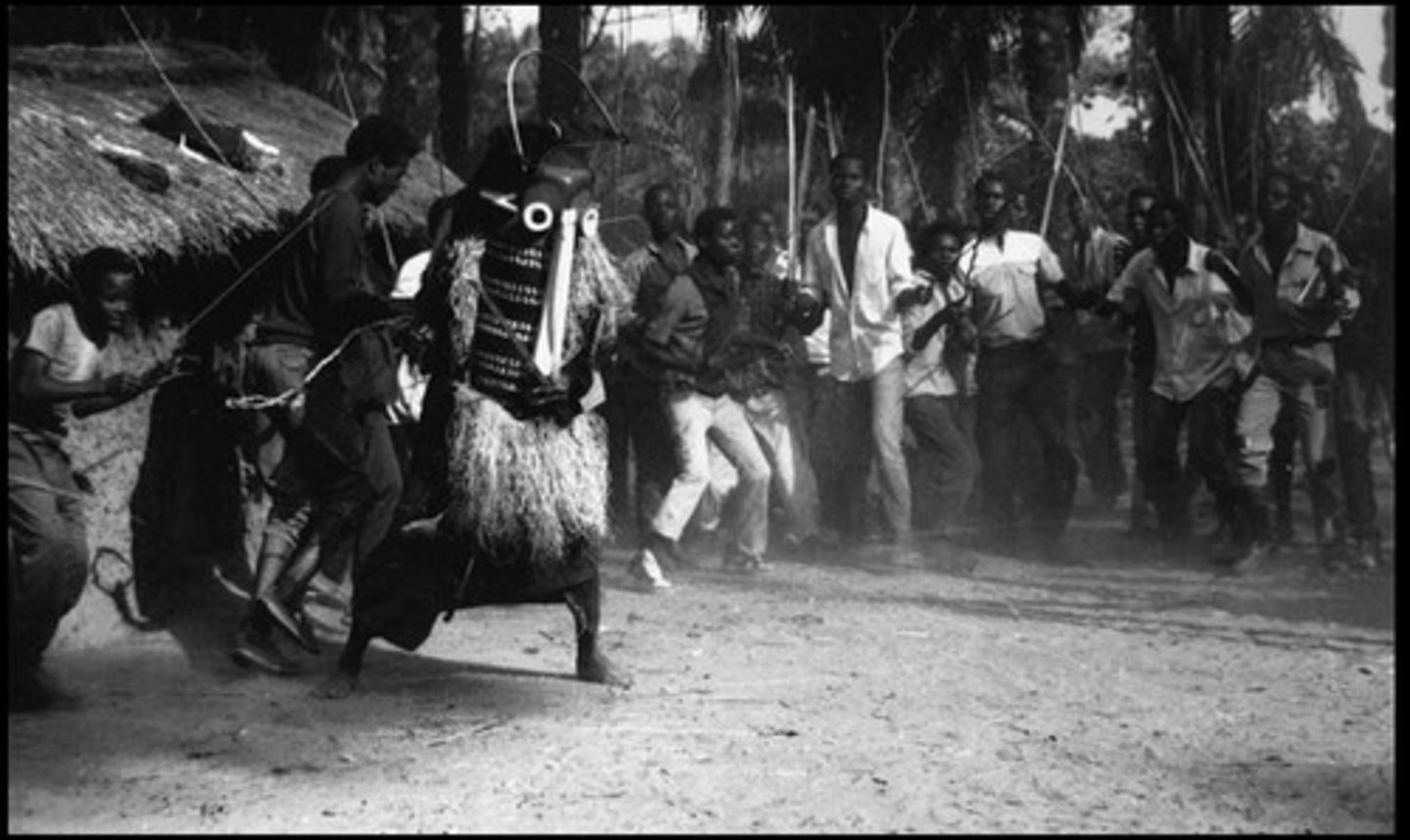
Kipoko Mask (Eastern Pende)
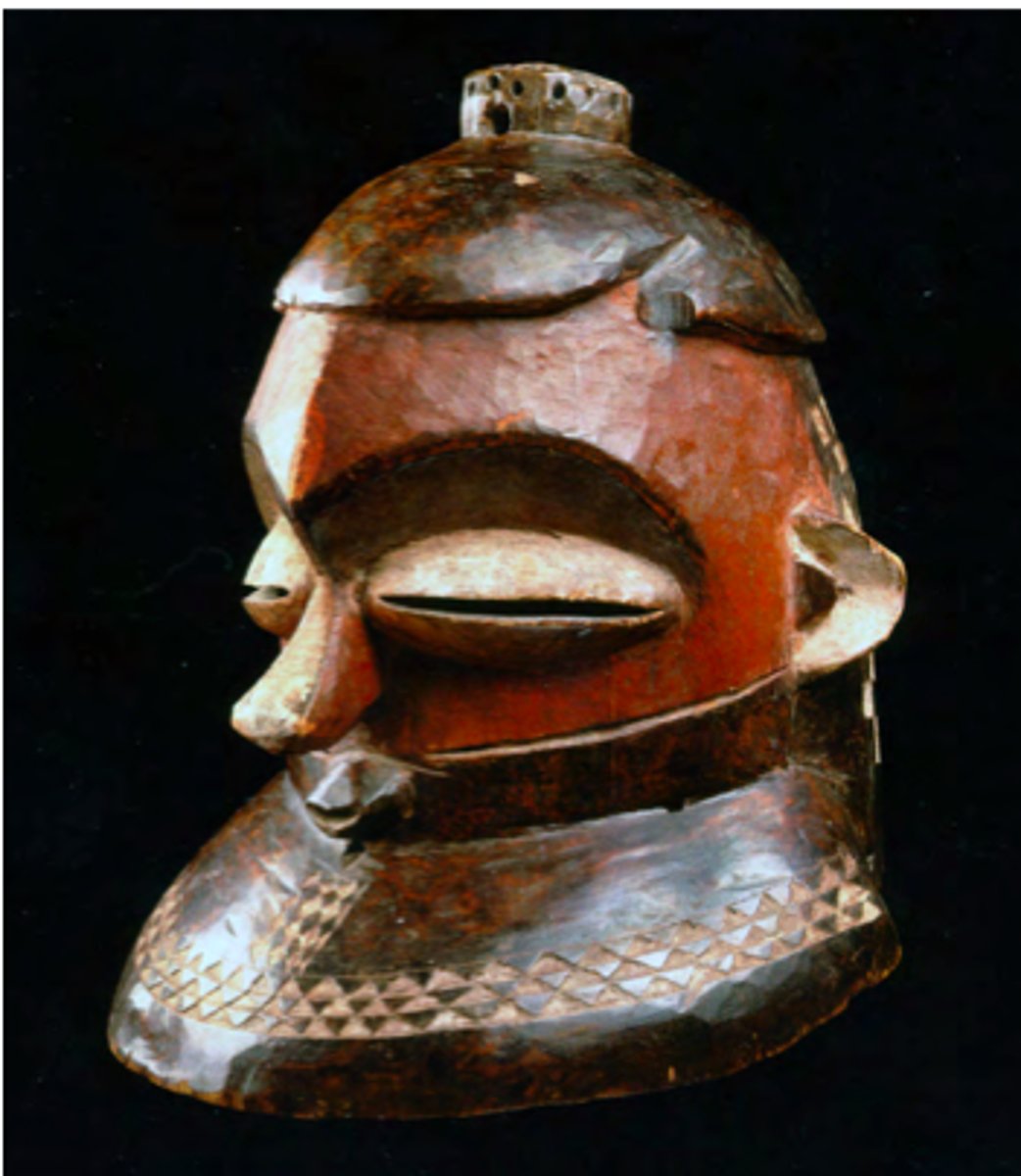
Kipoko
Represents the Chief
Represents the benevolent side of the chief
Reminds chief and people of how the chief should behave
coiffure
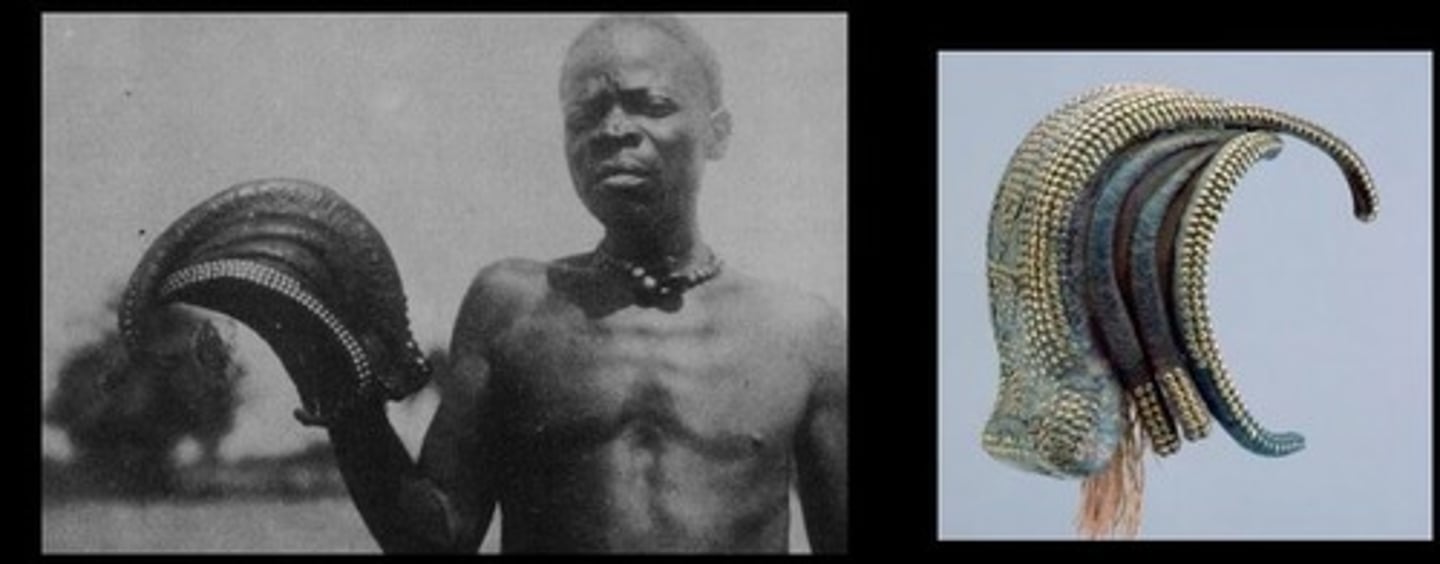
Coiffure (Western Pende)
Point and braid hairstyles (Removable cap)
Mihango
Western Pende or Mbuun
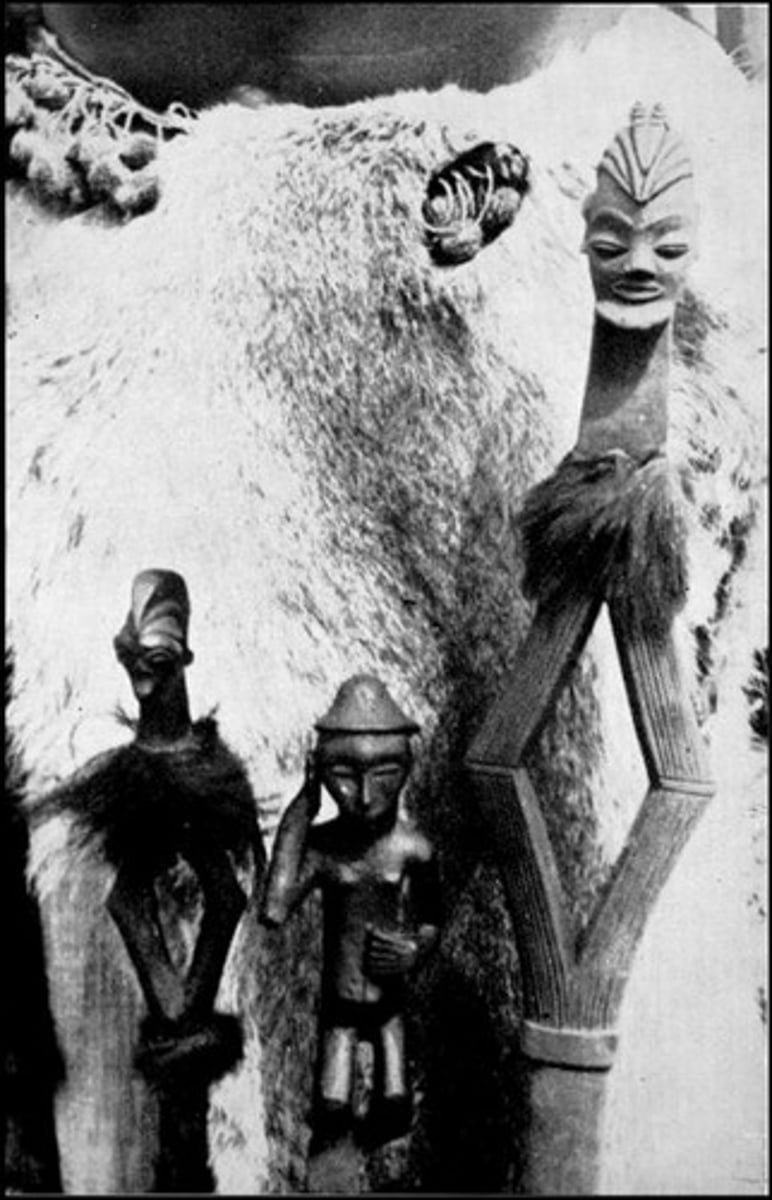
Pumbu (Central Pende)
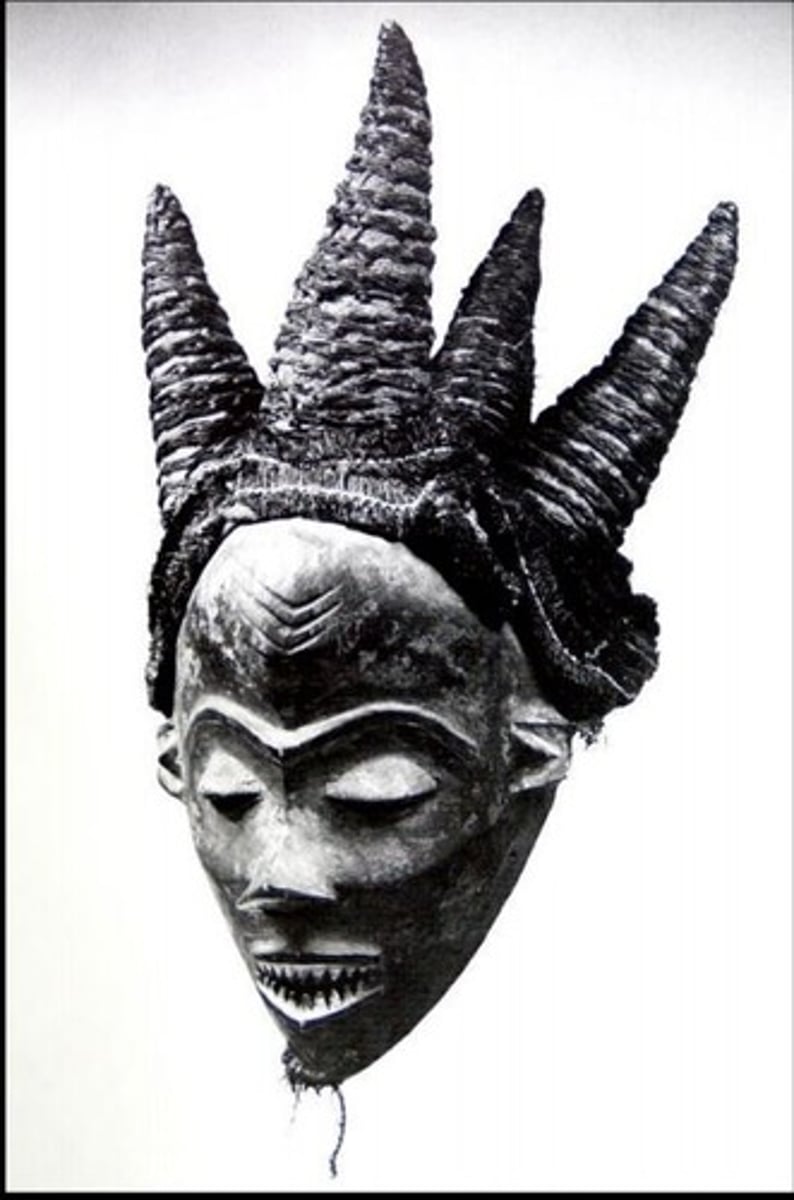
Gikhokho
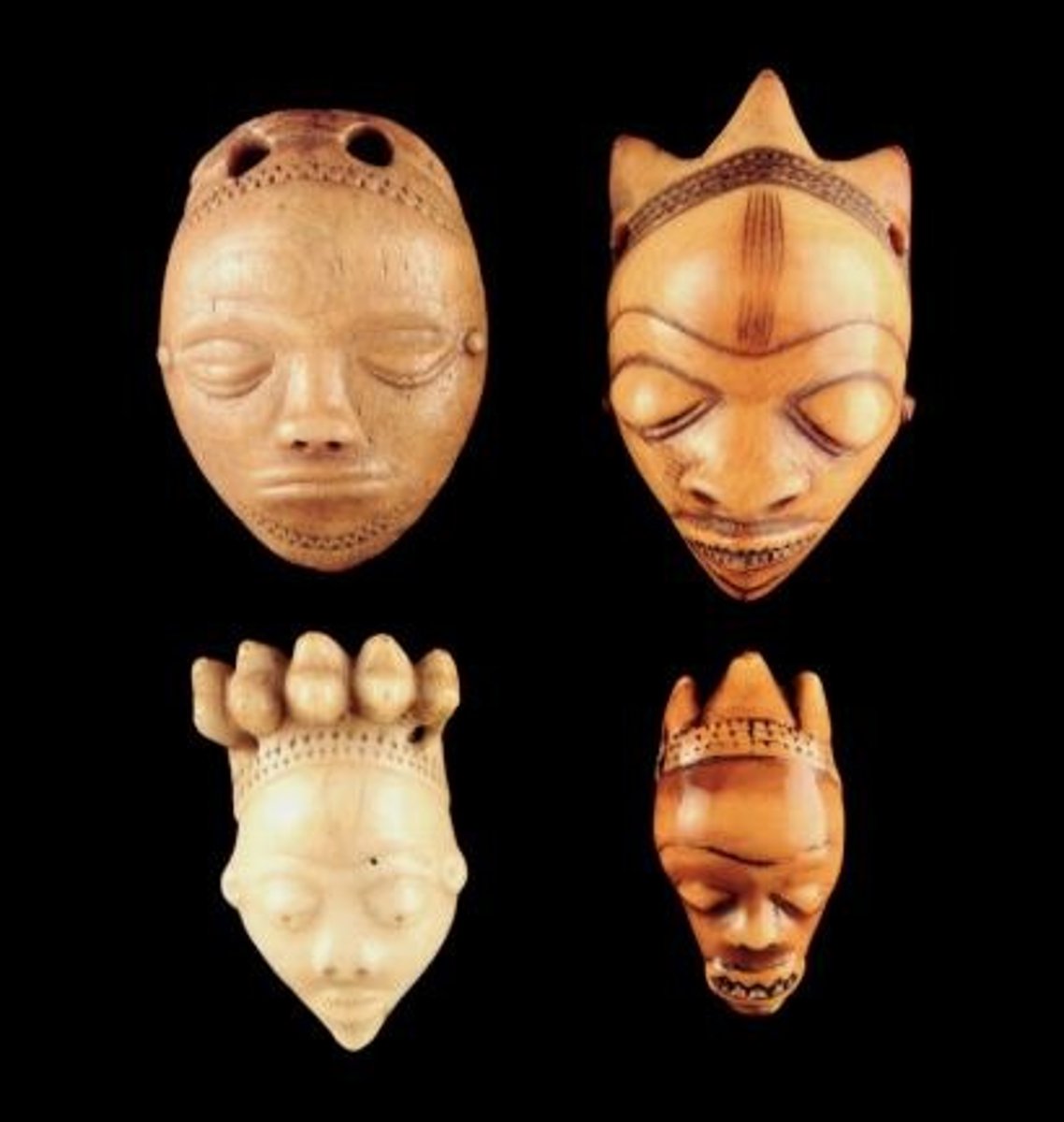
Pim (Aesthetic Ideals)
Originality; Something new or novel
Bushek (Aesthetic Ideals)
Beauty and goodness are the same
Aesthetic Ideals of Pende
Both artistic qualities and a person's qualities should be the same: symmetry, balance, dignity, smoothness
Kuba (Bushoong) King
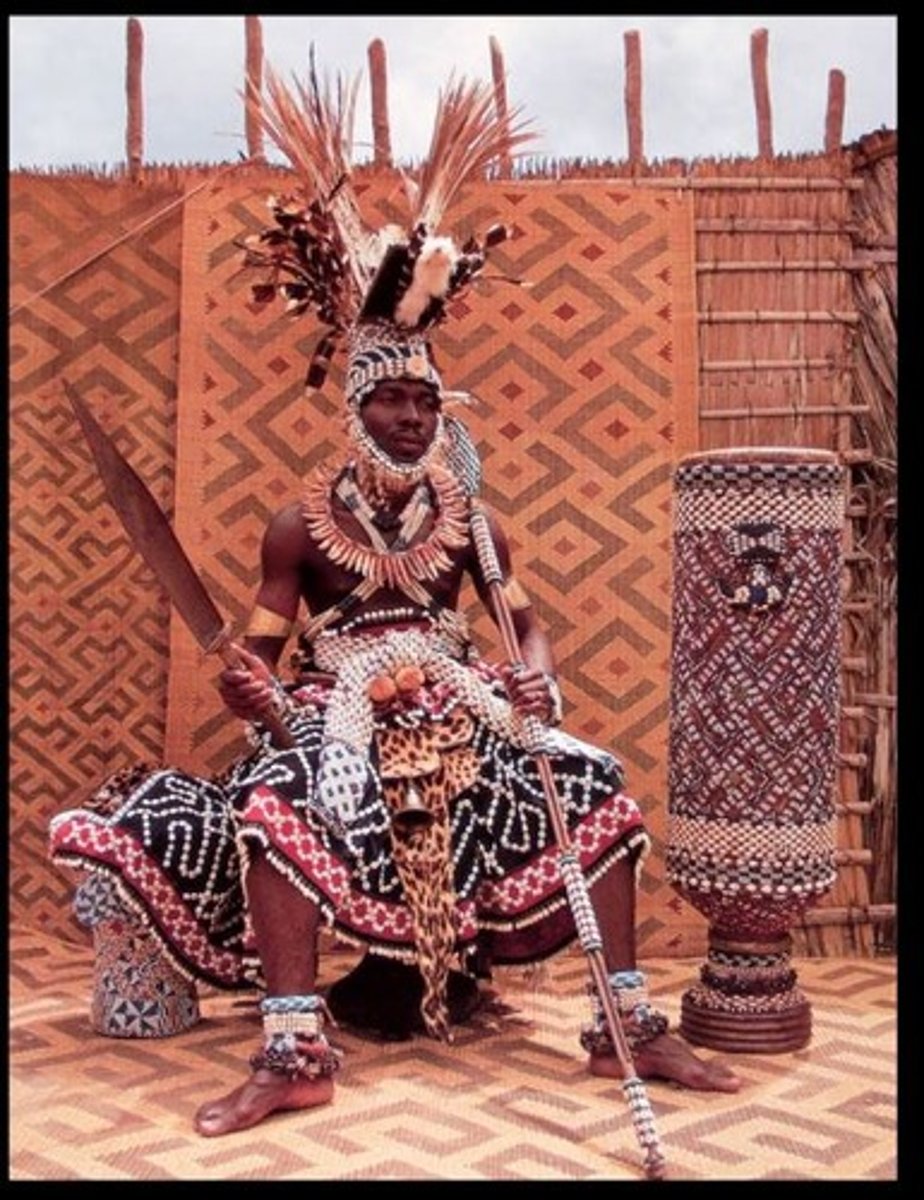
Kuba King (Nyim)
The king (Nyim)
Raised above ground, seated
Highly patterned wardrobe
Leopard skin, Eagle feathers, Cowrie shells,
Ndop
Sulpture, Portrait of king
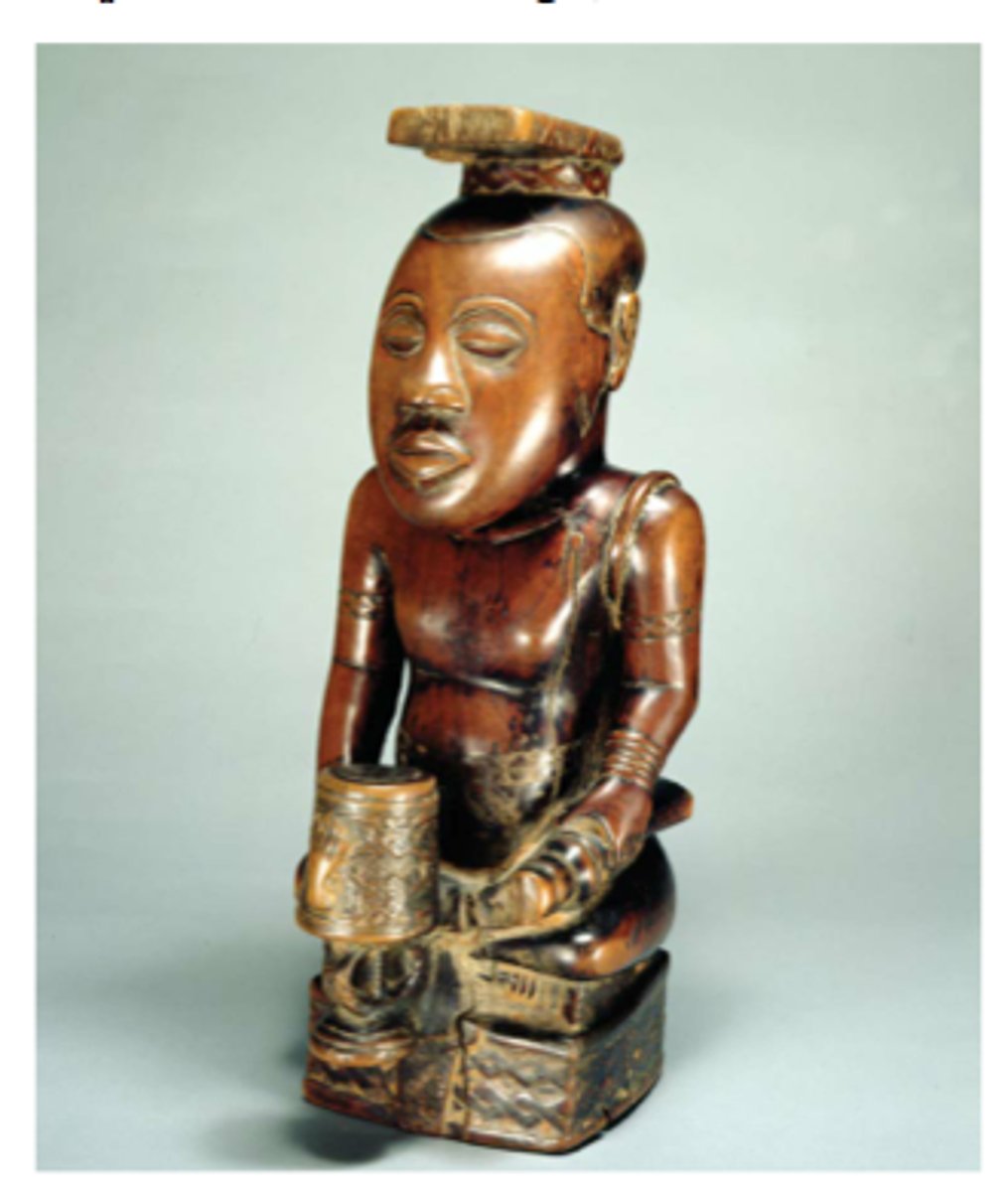
Ndop (Attributes)
Raised, seated figure with patterning
Spiritual image of king
Calmness, Smoothness, Dignity of face
Cowrie shells carved in
Itoom (image)
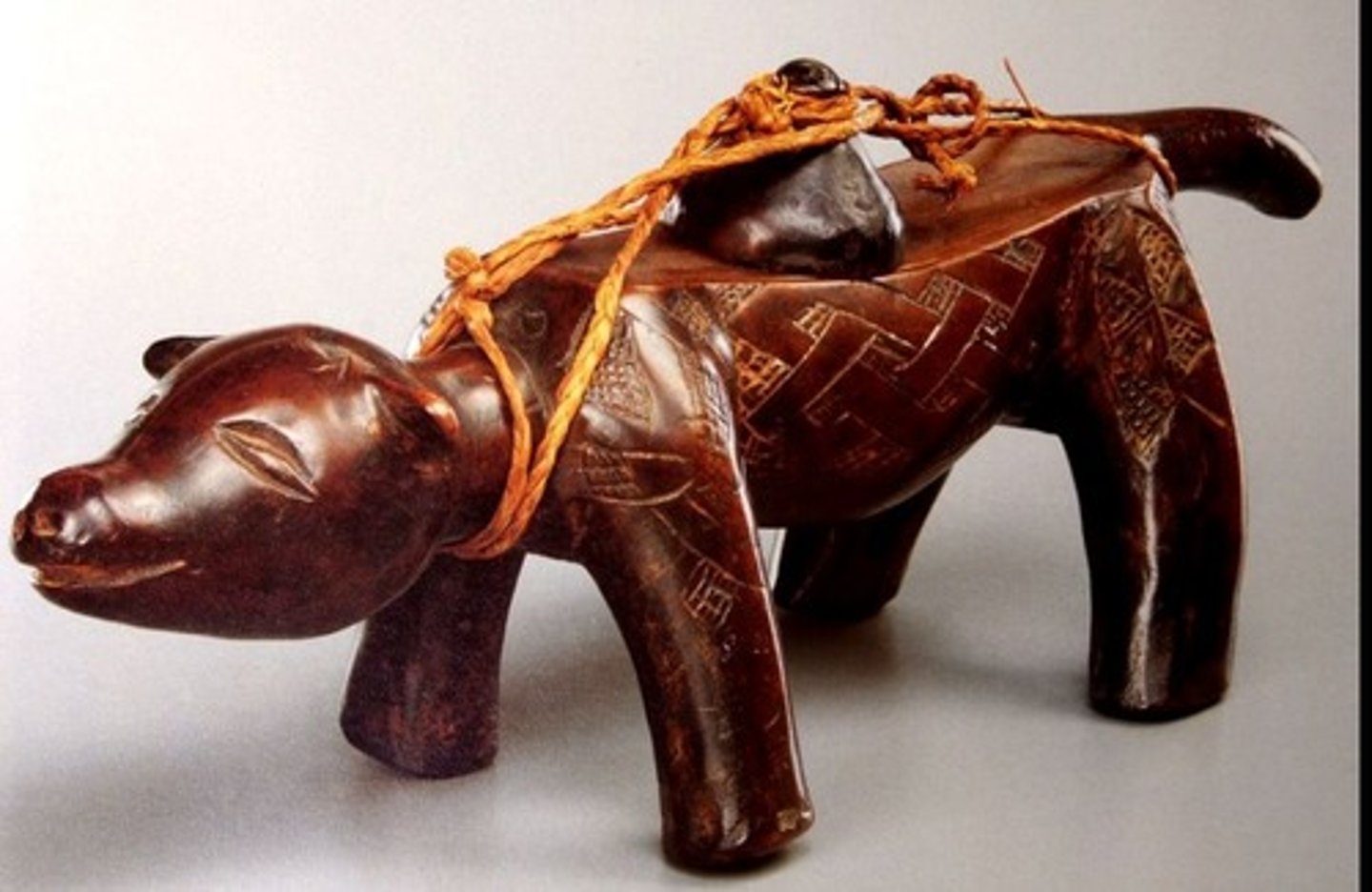
Itoom
Friction Oracle used by a diviner
Wherever the friction implement would stop would divine information
Figure of animals
Tell my mother I won't come again. I'm a novice now.
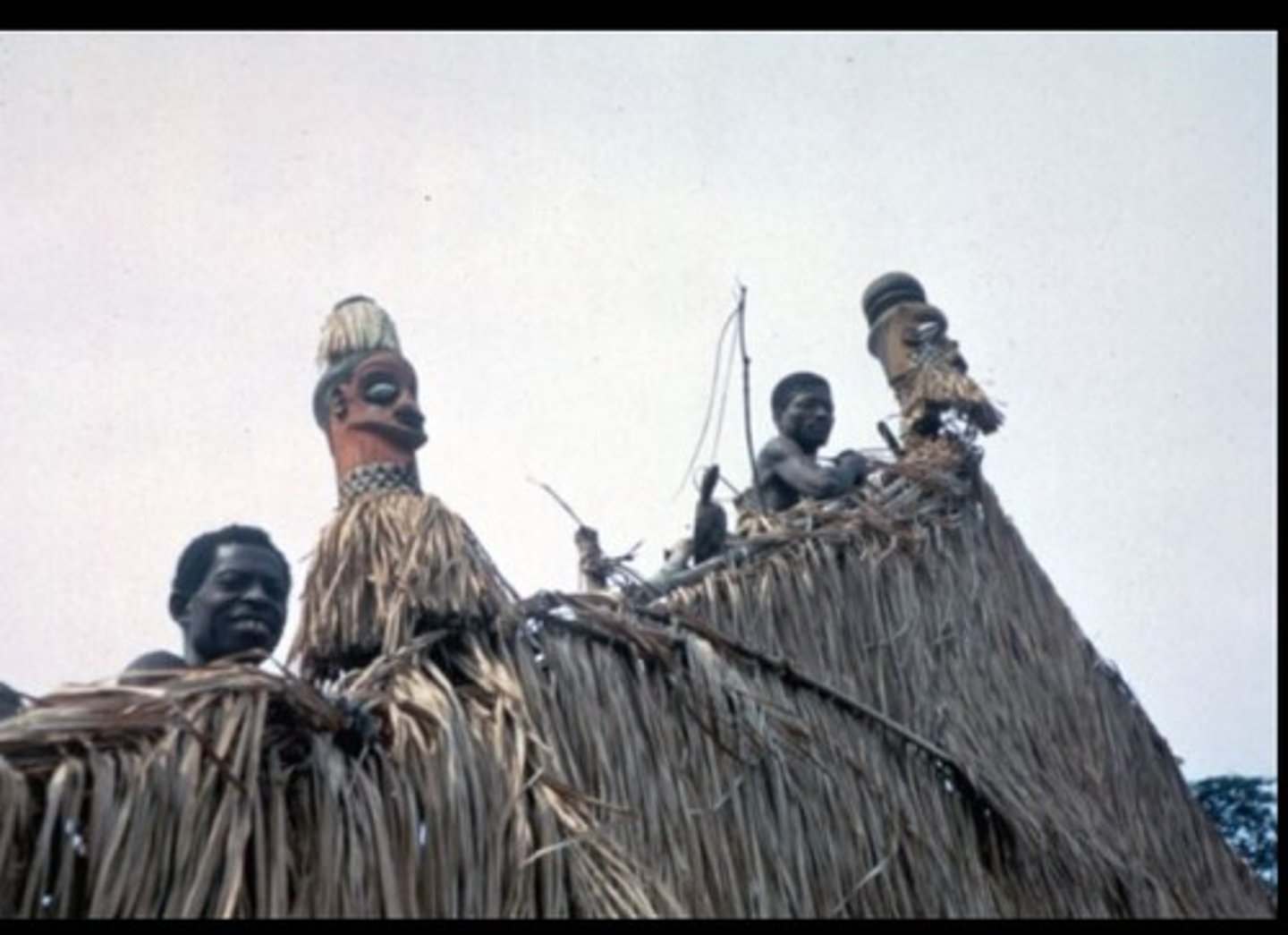
Mushindu
Uninitiated
Initiation (Kuba)
Boys are given titles to act out during initiation
Screens (Plant fiber wall) represent different posts and titles that mimic society
Represents how posts are supporting society
Boys must gather materials for masks
Entrance is hidden and only initiates know where entrance is
Traps and obstacles are placed outside the entrance
Safe space for boys to be able to practice their arts
Prestige with being able to perform more masks and create more masks
Ngady amwaash Bwoom and Moshambwooy
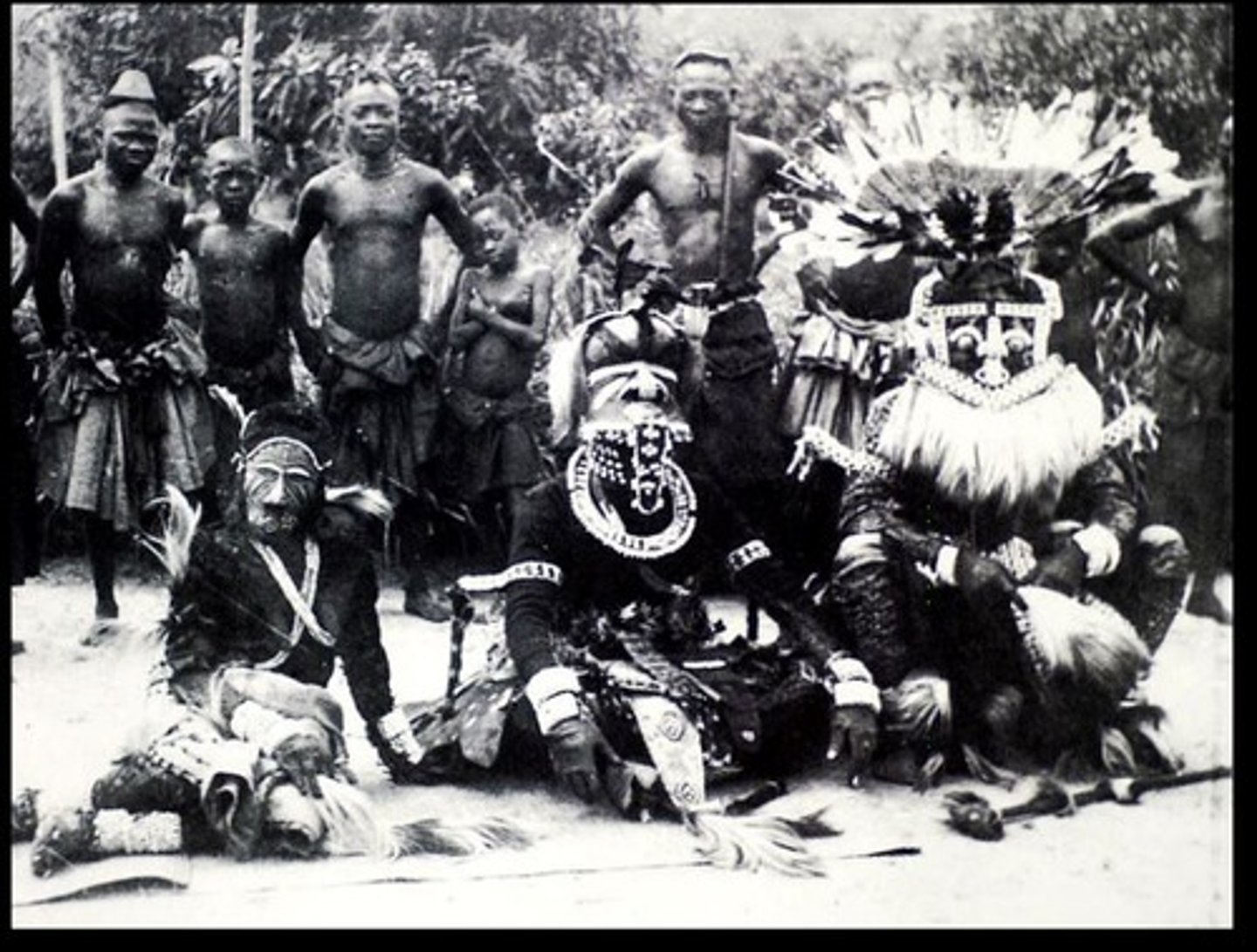
Moshambwooy (Image)
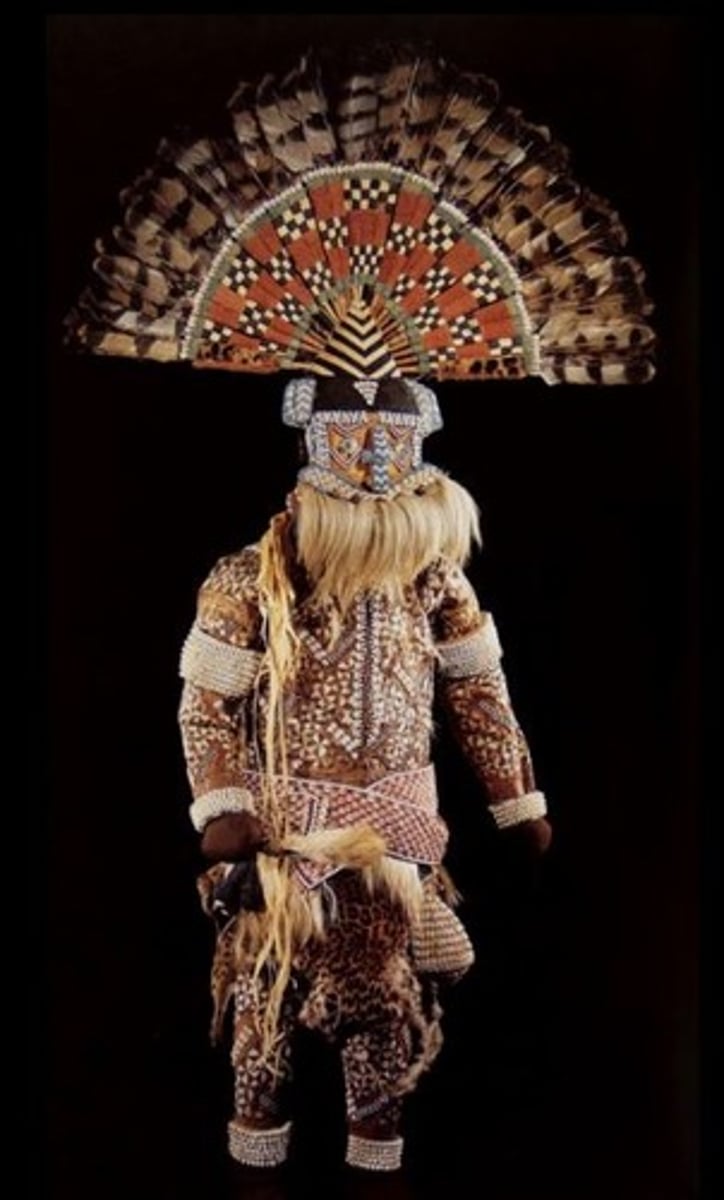
Moshambwooy
Elder mask
Feathers, goat hair, Circular/Fan shaped
Crossed Cowrie belt
Represents Woot (royal ancestor of Kuba kingdom)
Woot was married to his sister (Ngady amwaash)
Horizontal lines that stream down eyes (Tears and sadness)
Beaded section that goes down her nose and over her mouth
Tears of the misfortune that befel her and her people due to the incestuous relationship
Ngady amwaash (Mask)
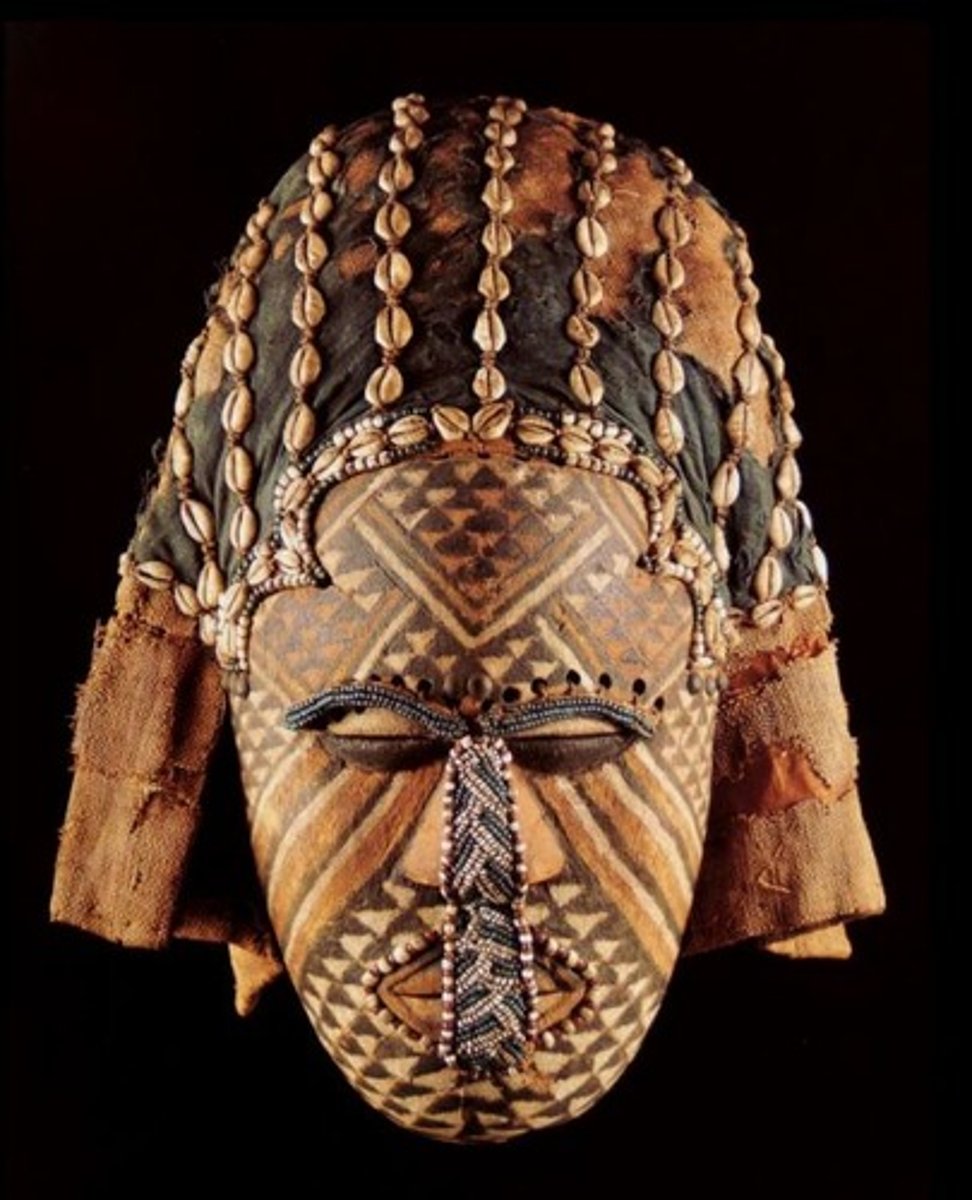
Bwoom (Mask)
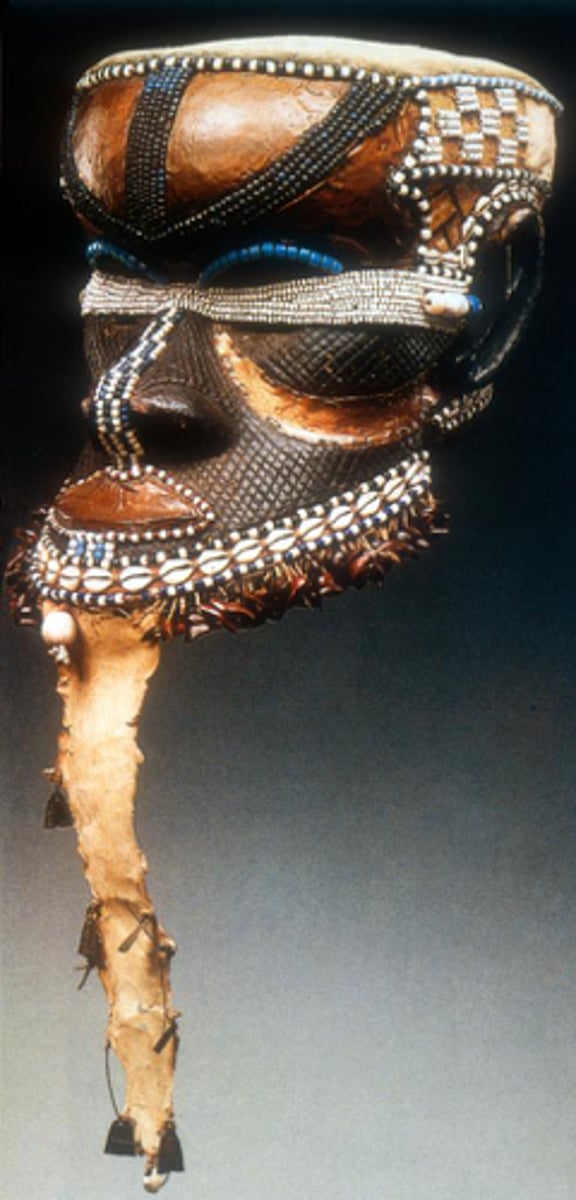
Bwoom (Attributes)
(Prince of Woot and Ngady)
Extended forhead (Waterhead)
Cowrie shells over eyes
Extended jawline
Wooden Mask with metal applied
Ngady Amwaash (attributes)
Horizontal lines that stream down eyes (Tears and sadness)
Female Mask type with metal applied
Kibango (Attributes)
Scarification carved in, can have a patina
Female Figure atop a paddle structure
Kibango
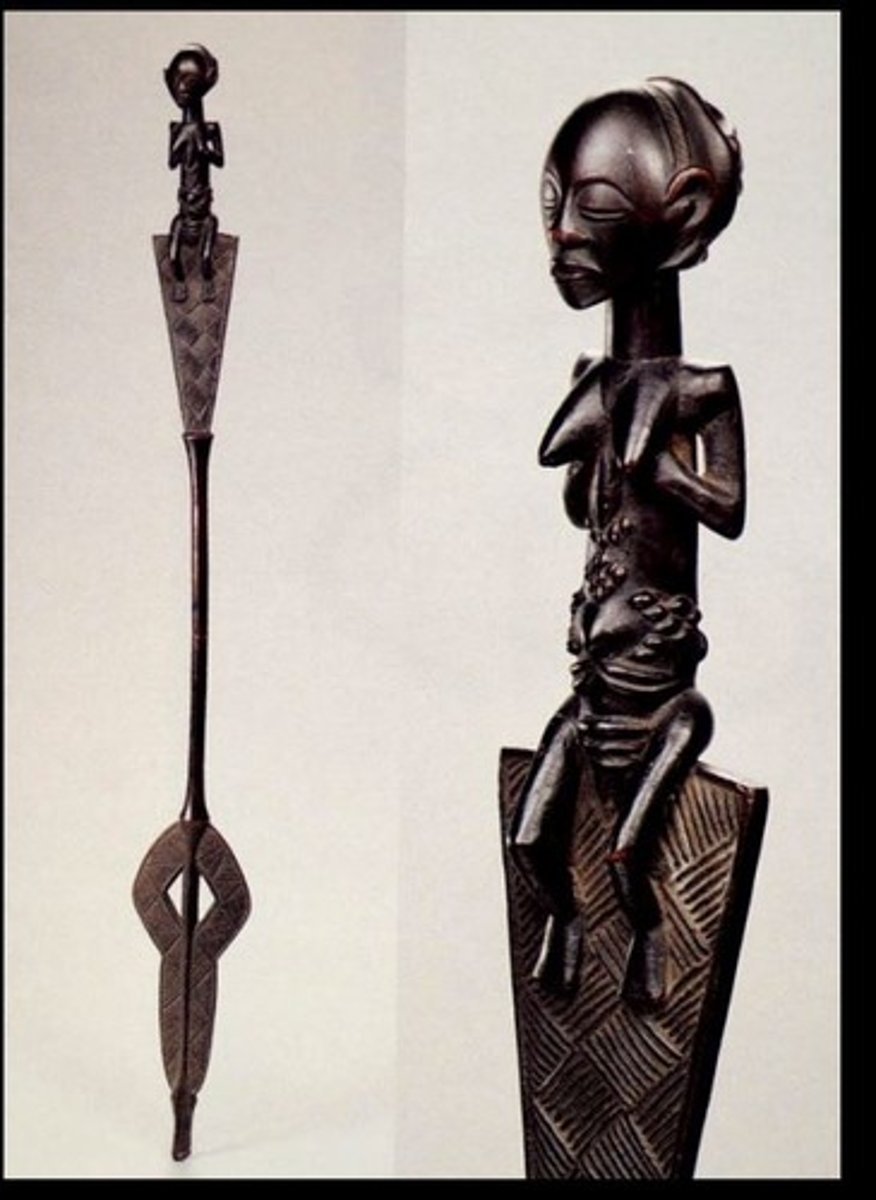
Caryatid Stool (Attributes)
Seat for the king
(Female figure with weight bearing on them)
Kings spirit is reborn in a woman and this figure represents that woman
Very powerful, may be kept in other villages to protect the king from spiritual damage
The life of the king is in the hands of women that surround him
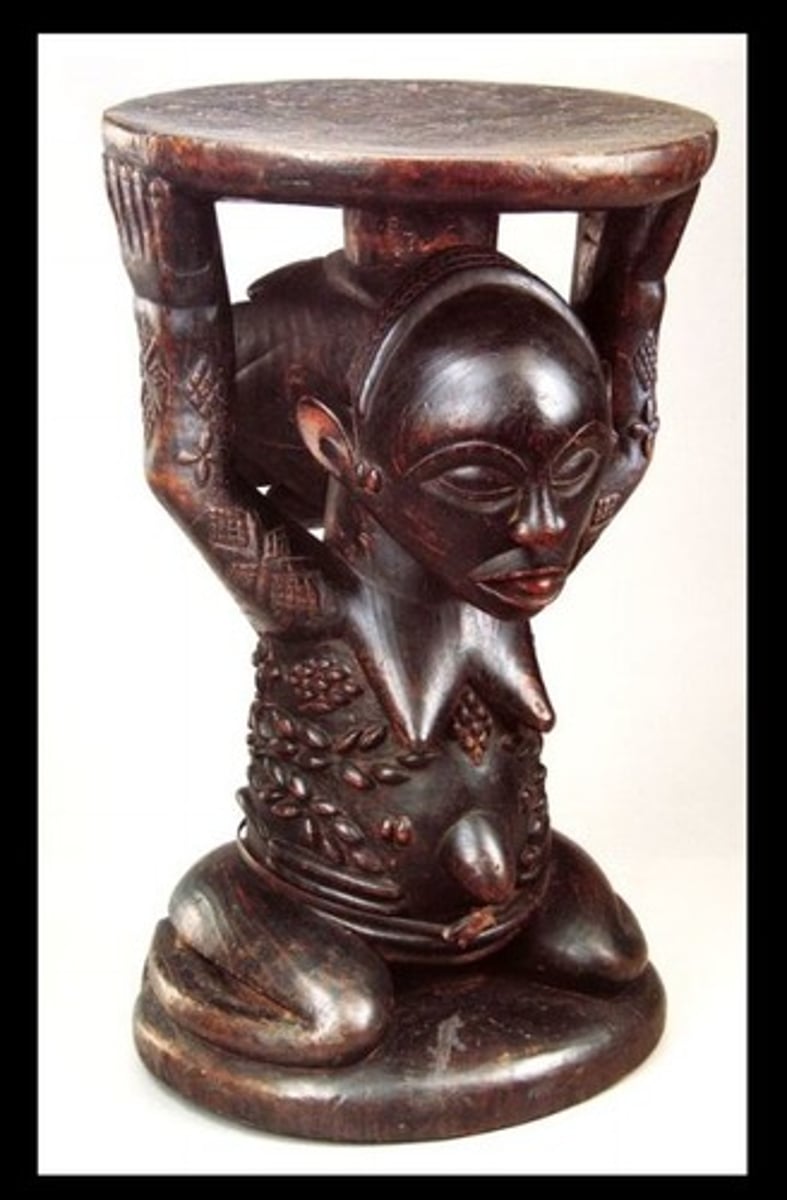
Kaposhi Hairstyle
Crossed hair in back of head
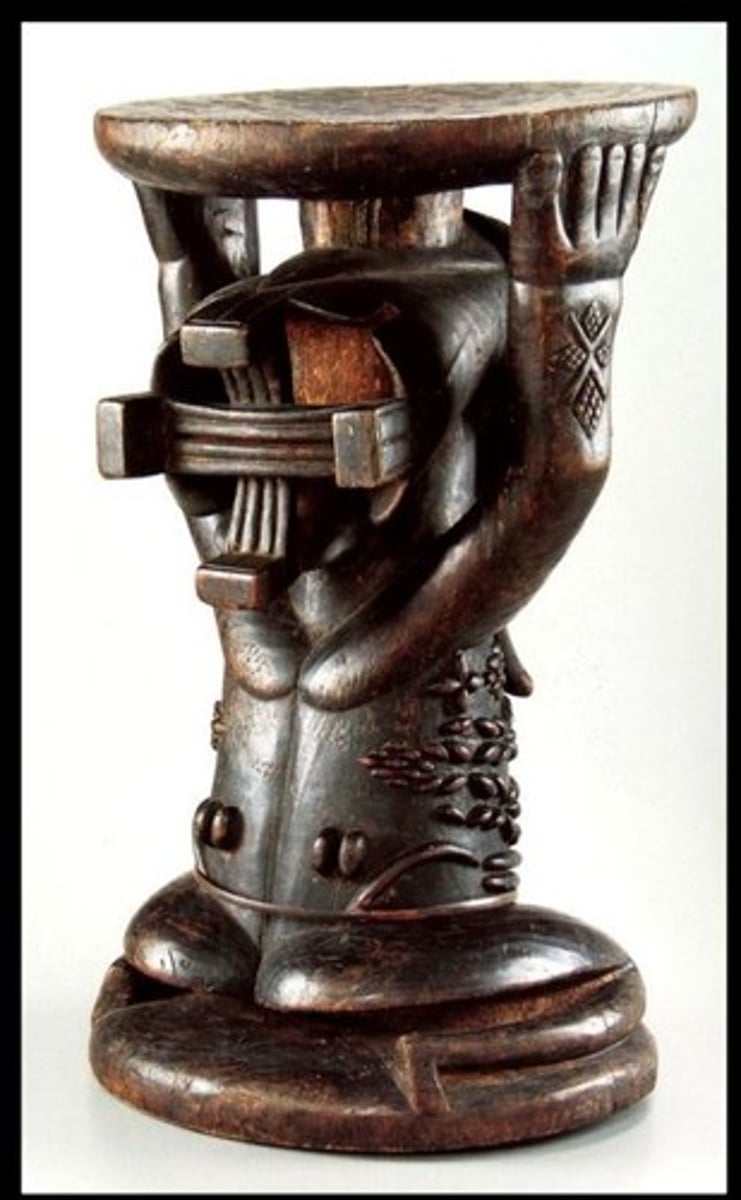
Kaposhi Hairstyle (Image)
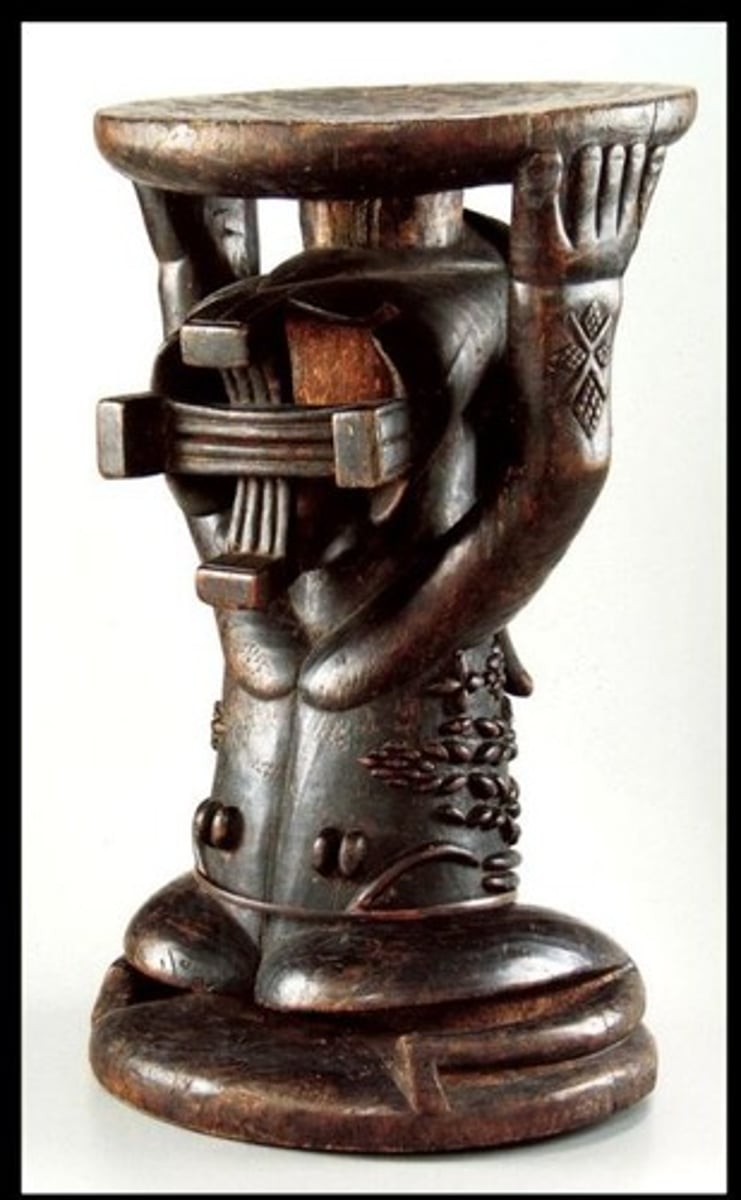
Caryatid Stool (Image)
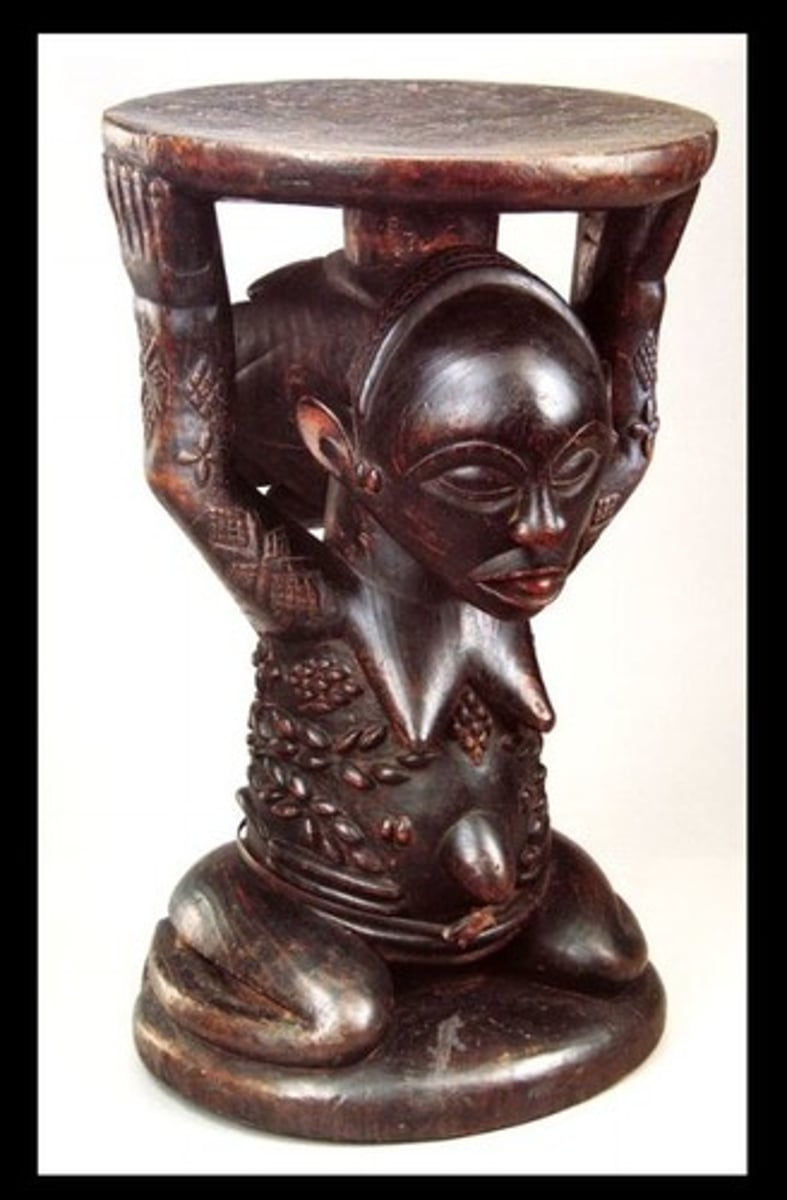
Master of the Cascade Coiffure (Mikada Hairdo)
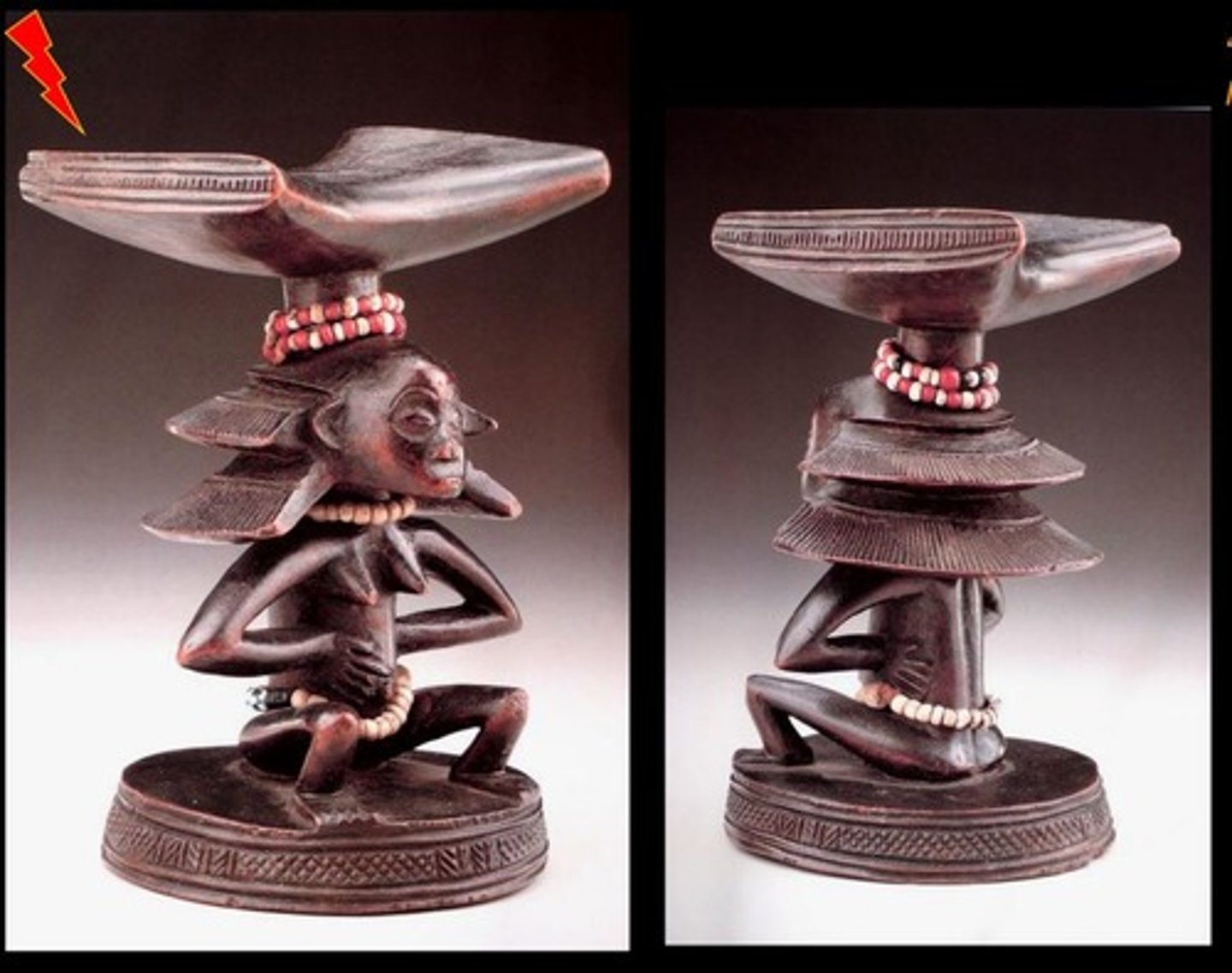
Master of Cascade Coiffure (Attributes)
Headrest prodominantly expressed upon
Carved figure supporting
Headdress (waterfall headdress)
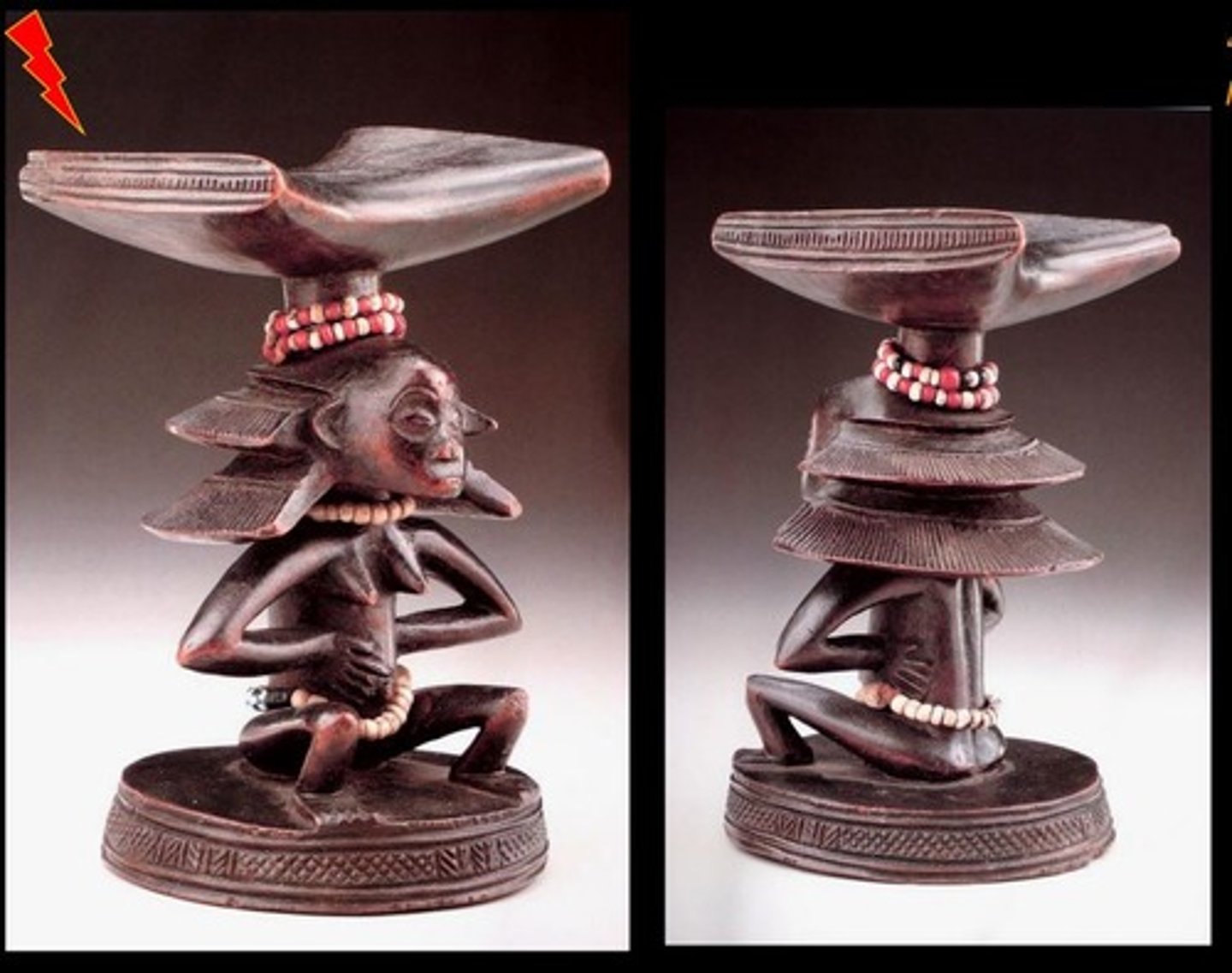
Sognye Nkishi
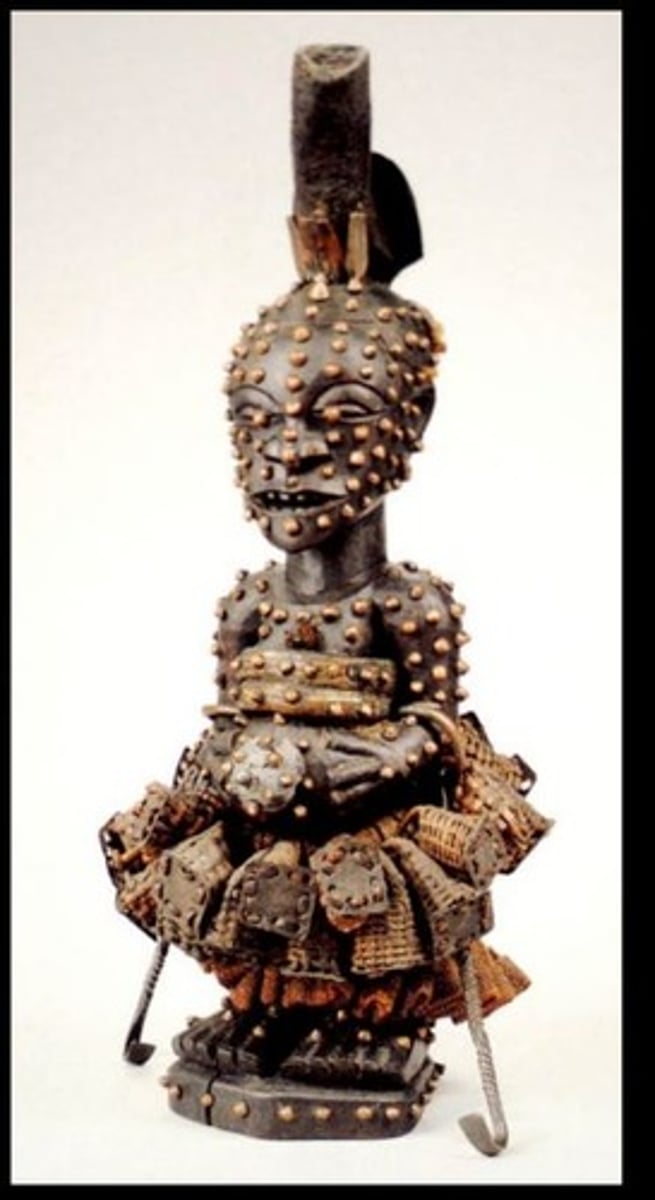
Lukwakongo (mask)
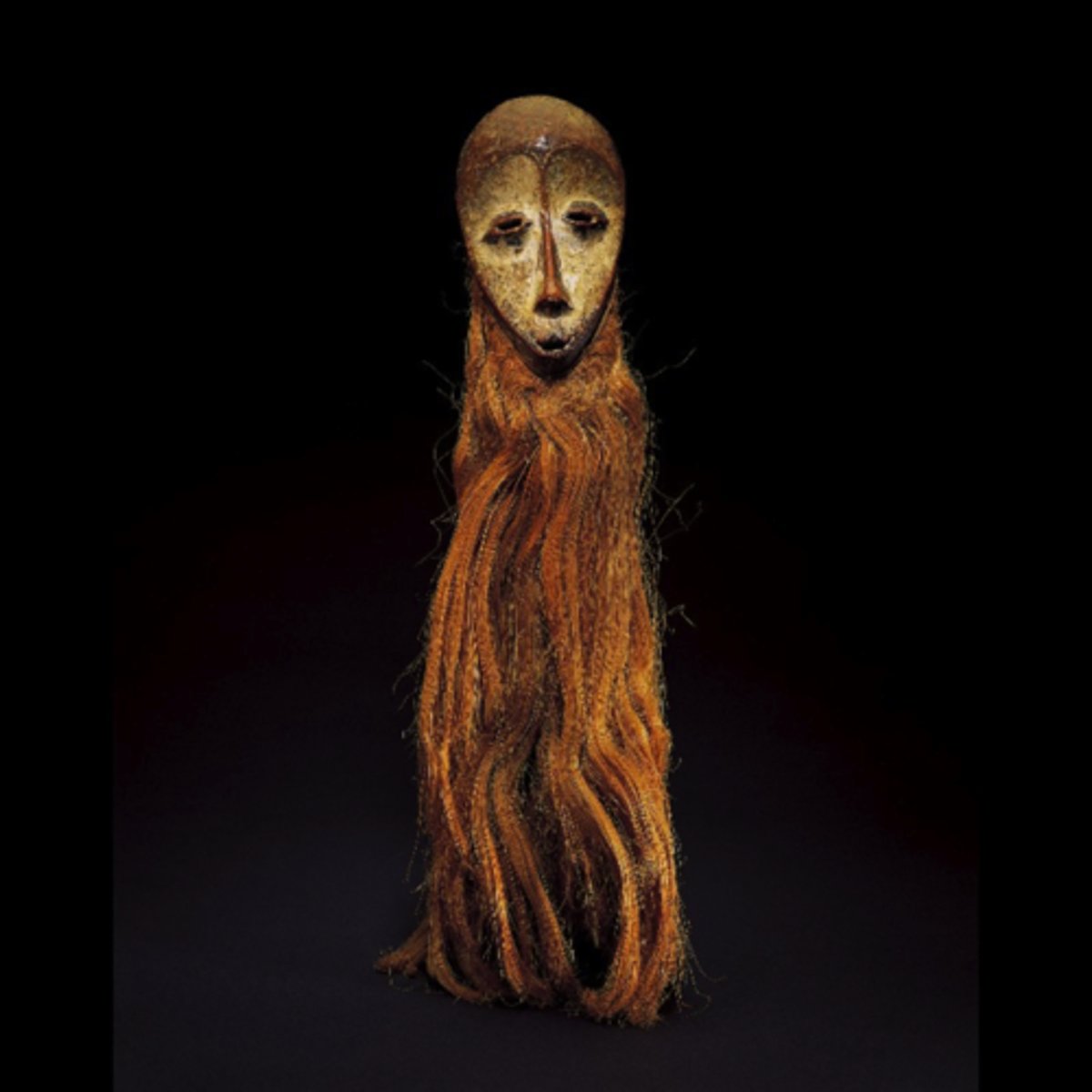
Kifwebe Mask (Eastern Sognye)
Tricolored is male
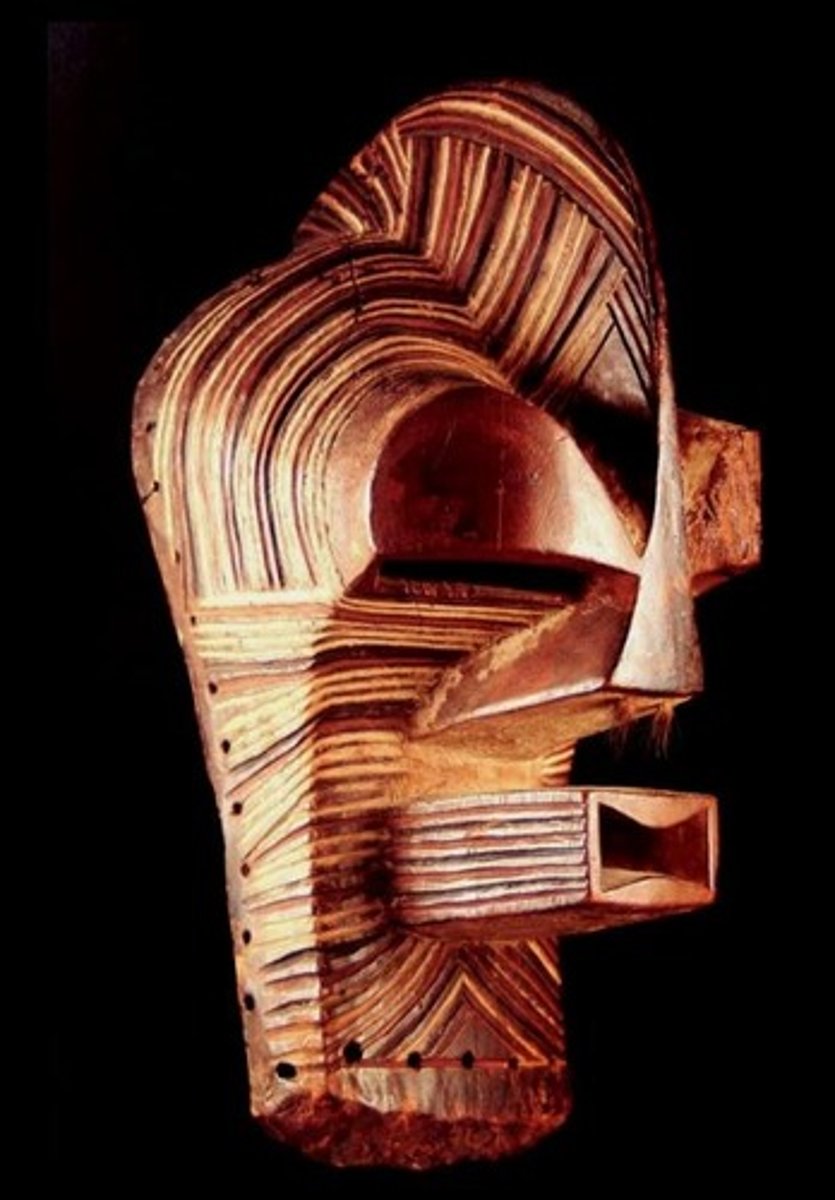
Kifwebe Mask (Attributes)
Bwadi wa _______
Concerned with keeping control in a village
Masks come out insets
3 types
2 male
Young and old
Tall crest is older male, small younger male
Black white and red is male
1 female
White female
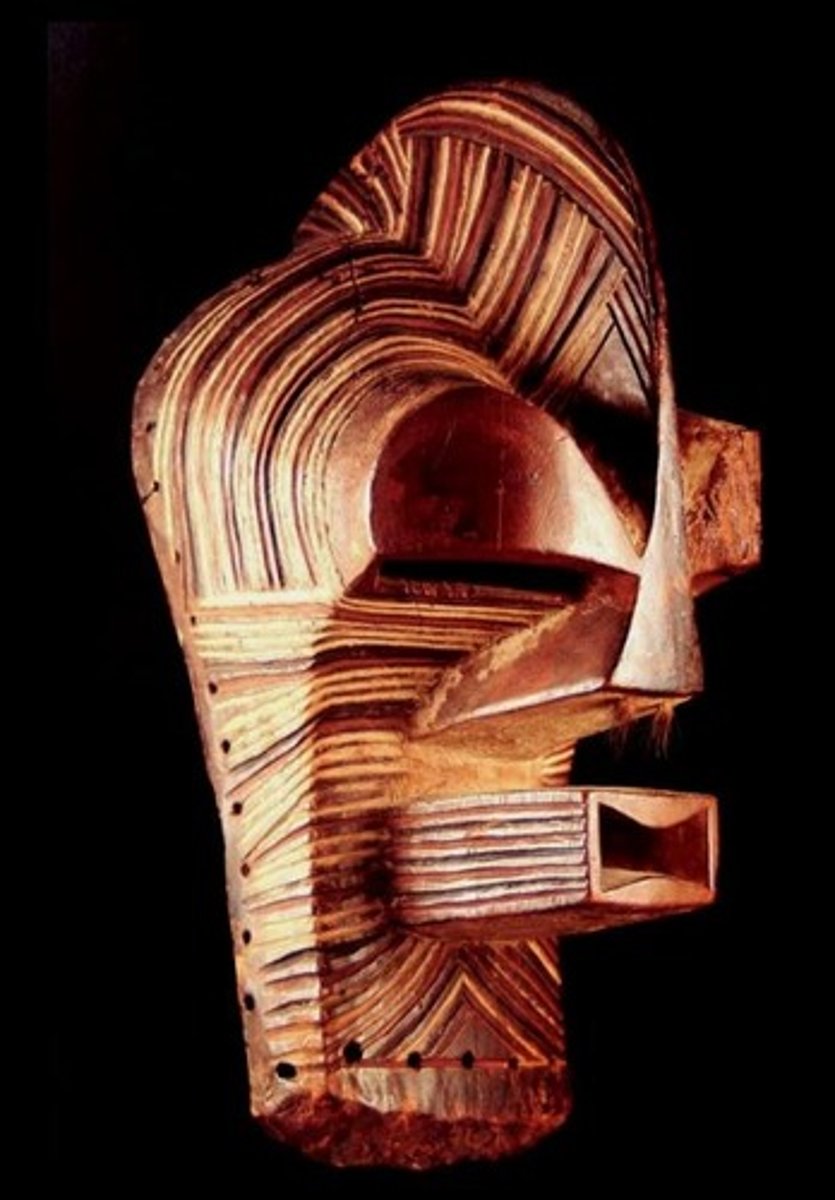
Kifwebe Dance (Attributes)
Not animal human or purely spiritual Similar to concept of So'o
______ enters a state of transition (Transitional ngulugu)
Masks must be activated
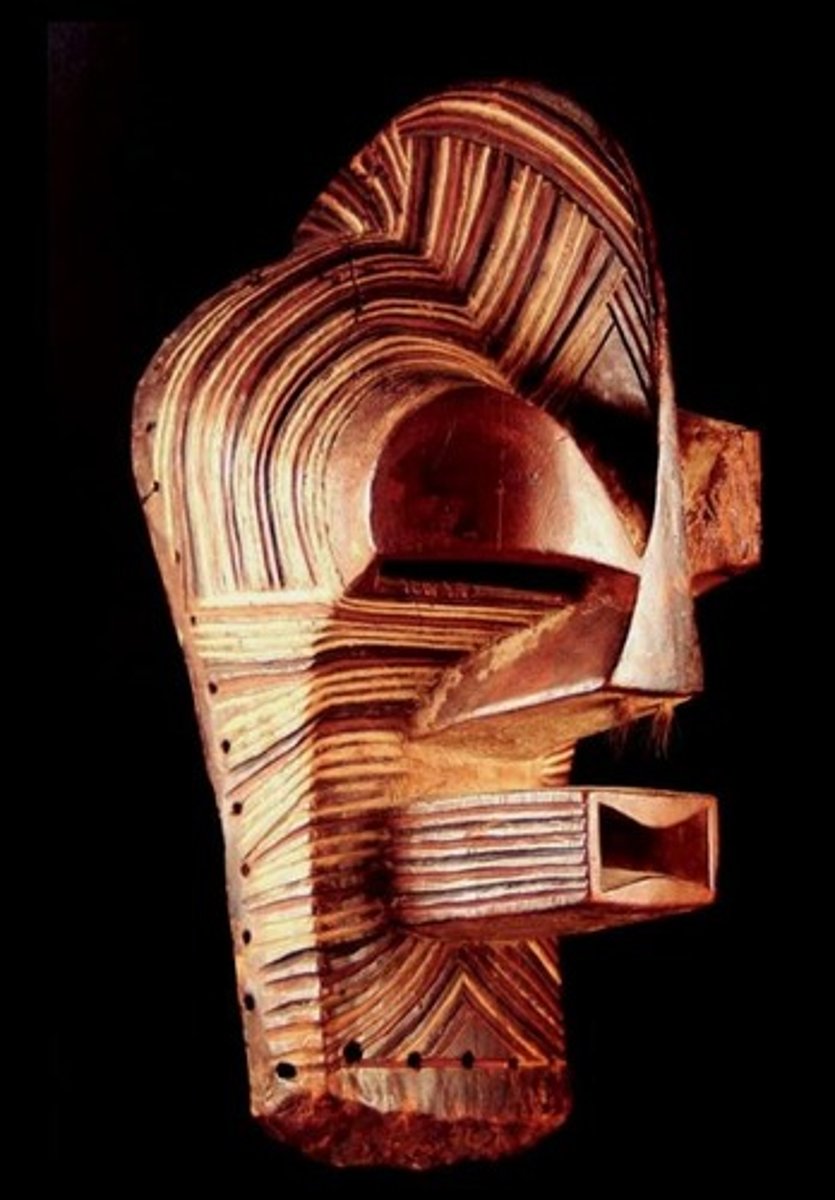
Bwami Societies
Lutombo Iwa Kindi
Lutombo Iwa yanio
Ultimate goal to obtain busoga (Good is beautiful, beautiful is good)
Used objects as didactic objects to teach younger grades
Higher 2 levels of Bwami wear hats that have horns, and other animal pieces
Cannot be promoted unless life partner is promoted
Iginga (Katanda) (attributes)
Some type of anthropomorphic figure (usually small, meant to be carried in hands)
Object that sustains the teachings and precepts of bwami
Katanda is the flattened person (lazy person who does nothing in the community so everyone can step all over them)
Holes in figure represents laziness as an illness
Kasangala -judge rendering decision
Stacked faces
Animal figures
Human figures made out of ivory (Kindi reserved)
Heads with cowrie shells for eyes
Represent something of someone who has achieved Kindi
Only kindi wear hats
Iginga (Image)
